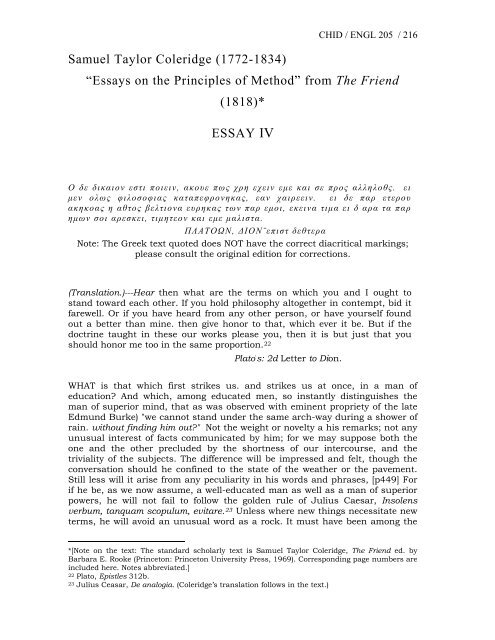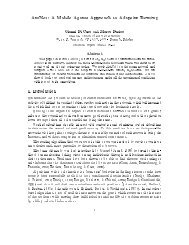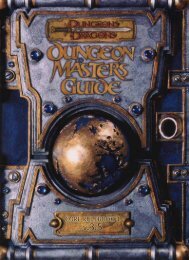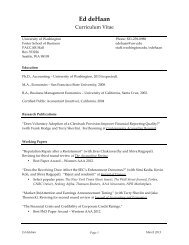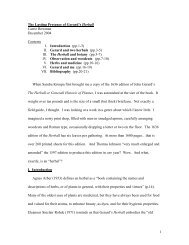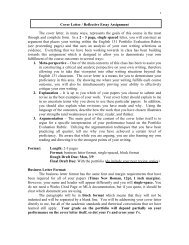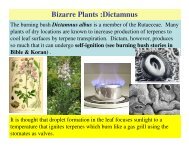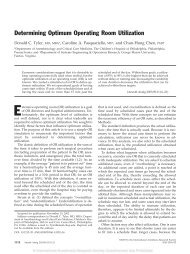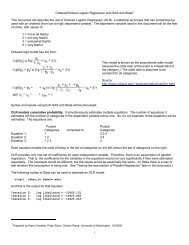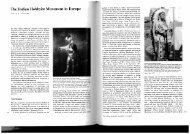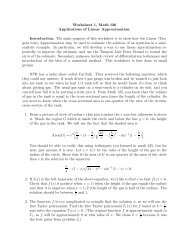Samuel Taylor Coleridge (1772-1834) “Essays on the Principles of ...
Samuel Taylor Coleridge (1772-1834) “Essays on the Principles of ...
Samuel Taylor Coleridge (1772-1834) “Essays on the Principles of ...
Create successful ePaper yourself
Turn your PDF publications into a flip-book with our unique Google optimized e-Paper software.
<str<strong>on</strong>g>Samuel</str<strong>on</strong>g> <str<strong>on</strong>g>Taylor</str<strong>on</strong>g> <str<strong>on</strong>g>Coleridge</str<strong>on</strong>g> (<str<strong>on</strong>g>1772</str<strong>on</strong>g>-<str<strong>on</strong>g>1834</str<strong>on</strong>g>)<br />
CHID / ENGL 205 / 216<br />
<str<strong>on</strong>g>“Essays</str<strong>on</strong>g> <strong>on</strong> <strong>the</strong> <strong>Principles</strong> <strong>of</strong> Method” from The Friend<br />
(1818)*<br />
ESSAY IV<br />
Ο δε δικαιον εστι ποιειν, ακουε πως χρη εχειν εμε και σε προς αλληλοθς. ει<br />
μεν ολως φιλοσοφιας καταπεφρονηκας, εαν χαιρεειν. ει δε παρ ετερου<br />
ακηκοας η αθτος βελτιονα ευρηκας των παρ εμοι, εκεινα τιμα ει δ αρα τα παρ<br />
ημων σοι αρεσκει, τιμητεον και εμε μαλιστα.<br />
ΠΛΑΤΟΩΝ, ΔΙΟΝ¨επιστ δεθτερα<br />
Note: The Greek text quoted does NOT have <strong>the</strong> correct diacritical markings;<br />
please c<strong>on</strong>sult <strong>the</strong> original editi<strong>on</strong> for correcti<strong>on</strong>s.<br />
(Translati<strong>on</strong>.)---Hear <strong>the</strong>n what are <strong>the</strong> terms <strong>on</strong> which you and I ought to<br />
stand toward each o<strong>the</strong>r. If you hold philosophy altoge<strong>the</strong>r in c<strong>on</strong>tempt, bid it<br />
farewell. Or if you have heard from any o<strong>the</strong>r pers<strong>on</strong>, or have yourself found<br />
out a better than mine. <strong>the</strong>n give h<strong>on</strong>or to that, which ever it be. But if <strong>the</strong><br />
doctrine taught in <strong>the</strong>se our works please you, <strong>the</strong>n it is but just that you<br />
should h<strong>on</strong>or me too in <strong>the</strong> same proporti<strong>on</strong>. 22<br />
Plato 's: 2d Letter to Di<strong>on</strong>.<br />
WHAT is that which first strikes us. and strikes us at <strong>on</strong>ce, in a man <strong>of</strong><br />
educati<strong>on</strong>? And which, am<strong>on</strong>g educated men, so instantly distinguishes <strong>the</strong><br />
man <strong>of</strong> superior mind, that as was observed with eminent propriety <strong>of</strong> <strong>the</strong> late<br />
Edmund Burke) "we cannot stand under <strong>the</strong> same arch-way during a shower <strong>of</strong><br />
rain. without finding him out?" Not <strong>the</strong> weight or novelty a his remarks; not any<br />
unusual interest <strong>of</strong> facts communicated by him; for we may suppose both <strong>the</strong><br />
<strong>on</strong>e and <strong>the</strong> o<strong>the</strong>r precluded by <strong>the</strong> shortness <strong>of</strong> our intercourse, and <strong>the</strong><br />
triviality <strong>of</strong> <strong>the</strong> subjects. The difference will be impressed and felt, though <strong>the</strong><br />
c<strong>on</strong>versati<strong>on</strong> should he c<strong>on</strong>fined to <strong>the</strong> state <strong>of</strong> <strong>the</strong> wea<strong>the</strong>r or <strong>the</strong> pavement.<br />
Still less will it arise from any peculiarity in his words and phrases, [p449] For<br />
if he be, as we now assume, a well-educated man as well as a man <strong>of</strong> superior<br />
powers, he will not fail to follow <strong>the</strong> golden rule <strong>of</strong> Julius Caesar, Insolens<br />
verbum, tanquam scopulum, evitare. 23 Unless where new things necessitate new<br />
terms, he will avoid an unusual word as a rock. It must have been am<strong>on</strong>g <strong>the</strong><br />
*[Note <strong>on</strong> <strong>the</strong> text: The standard scholarly text is <str<strong>on</strong>g>Samuel</str<strong>on</strong>g> <str<strong>on</strong>g>Taylor</str<strong>on</strong>g> <str<strong>on</strong>g>Coleridge</str<strong>on</strong>g>, The Friend ed. by<br />
Barbara E. Rooke (Princet<strong>on</strong>: Princet<strong>on</strong> University Press, 1969). Corresp<strong>on</strong>ding page numbers are<br />
included here. Notes abbreviated.]<br />
22 Plato, Epistles 312b.<br />
23 Julius Ceasar, De analogia. (<str<strong>on</strong>g>Coleridge</str<strong>on</strong>g>’s translati<strong>on</strong> follows in <strong>the</strong> text.)
CHID / ENGL 205 / 217<br />
earliest less<strong>on</strong>s <strong>of</strong> his youth, that <strong>the</strong> breach <strong>of</strong> this precept, at all times<br />
hazardous, becomes ridiculous in <strong>the</strong> topics <strong>of</strong> ordinary c<strong>on</strong>versati<strong>on</strong>. There<br />
remains but <strong>on</strong>e o<strong>the</strong>r point <strong>of</strong> distincti<strong>on</strong> possible; and this must be, and in<br />
fact is, <strong>the</strong> true cause <strong>of</strong> <strong>the</strong> impressi<strong>on</strong> made <strong>on</strong> us. It is <strong>the</strong> unpremeditated<br />
and evidently habitual arrangement <strong>of</strong> his words, grounded <strong>on</strong> <strong>the</strong> habit <strong>of</strong><br />
foreseeing, in each integral part, or (more plainly) in every sentence, <strong>the</strong> whole<br />
that he <strong>the</strong>n intends to communicate. However irregular and desultory his talk,<br />
<strong>the</strong>re is method in <strong>the</strong> fragments.<br />
Listen, <strong>on</strong> <strong>the</strong> o<strong>the</strong>r hand, to an ignorant man, though perhaps shrewd and<br />
able in his particular calling; whe<strong>the</strong>r he be describing or relating. We<br />
immediately perceive, that his memory al<strong>on</strong>e is called into acti<strong>on</strong>; and that <strong>the</strong><br />
objects and events recur in <strong>the</strong> narrati<strong>on</strong> in <strong>the</strong> same order, and with <strong>the</strong> same<br />
accompaniments, however accidental or impertinent, as <strong>the</strong>y had first occurred<br />
to <strong>the</strong> narrator. The necessity <strong>of</strong> taking breath, <strong>the</strong> efforts <strong>of</strong> recollecti<strong>on</strong>, and<br />
<strong>the</strong> abrupt rectificati<strong>on</strong> <strong>of</strong> its failures, produce all his pauses; and with<br />
excepti<strong>on</strong> <strong>of</strong> <strong>the</strong> "and <strong>the</strong>n," <strong>the</strong> "and <strong>the</strong>re," and <strong>the</strong> still less significant, "and<br />
so," <strong>the</strong>y c<strong>on</strong>stitute likewise all his c<strong>on</strong>necti<strong>on</strong>s.<br />
Our discussi<strong>on</strong>, however, is c<strong>on</strong>fined to Method as employed in <strong>the</strong> formati<strong>on</strong><br />
<strong>of</strong> <strong>the</strong> understanding, and in <strong>the</strong> c<strong>on</strong>structi<strong>on</strong>s <strong>of</strong> science and literature. It<br />
would indeed be superfluous to attempt a pro<strong>of</strong> <strong>of</strong> its importance in <strong>the</strong><br />
business and ec<strong>on</strong>omy <strong>of</strong> active or domestic life. From <strong>the</strong> cotter's hearth or <strong>the</strong><br />
workshop <strong>of</strong> <strong>the</strong> artisan, to <strong>the</strong> palace or <strong>the</strong> arsenal, <strong>the</strong> first merit, that which<br />
admits nei<strong>the</strong>r substitute nor equivalent, is, that every thing is in its place.<br />
Where this charm is wanting, every o<strong>the</strong>r merit ei<strong>the</strong>r loses its name, or<br />
becomes an additi<strong>on</strong>al ground <strong>of</strong> accusati<strong>on</strong> and regret. Of <strong>on</strong>e, by whom it is<br />
eminently possessed, we say proverbially, he is like clock-work. The<br />
resemblance extends bey<strong>on</strong>d <strong>the</strong> point <strong>of</strong> regularity, and yet falls short <strong>of</strong> <strong>the</strong><br />
truth. Both do, [p. 450] indeed, at <strong>on</strong>ce divide and announce <strong>the</strong> silent and<br />
o<strong>the</strong>rwise indistinguishable lapse <strong>of</strong> time. But <strong>the</strong> man <strong>of</strong> methodical industry<br />
and h<strong>on</strong>orable pursuits, does more: he realizes its ideal divisi<strong>on</strong>s, and gives a<br />
character and individuality to its moments. If <strong>the</strong> idle are described as killing<br />
time, he may be justly said to call it into life and moral being, while he makes it<br />
<strong>the</strong> distinct object not <strong>on</strong>ly <strong>of</strong> <strong>the</strong> c<strong>on</strong>sciousness, but <strong>of</strong> <strong>the</strong> c<strong>on</strong>science. He<br />
organizes <strong>the</strong> hours, and gives <strong>the</strong>m a soul: and that, <strong>the</strong> very essence <strong>of</strong> which<br />
is to fleet away, and evermore to have been, he takes up into his own<br />
permanence, and communicates to it <strong>the</strong> imperishableness <strong>of</strong> a spiritual nature.<br />
Of <strong>the</strong> good and faithful servant, whose energies, thus directed, are thus<br />
methodized, it is less truly affirmed, that He lives in time, than that Time lives<br />
in him. His days, m<strong>on</strong>ths, and years, as <strong>the</strong> stops and punctual marks in <strong>the</strong><br />
records <strong>of</strong> duties performed, will survive <strong>the</strong> wreck <strong>of</strong> worlds, and remain extant<br />
when time itself shall be no more.<br />
But as <strong>the</strong> importance <strong>of</strong> Method in <strong>the</strong> duties <strong>of</strong> social life is incomparably<br />
greater, so are its practical elements proporti<strong>on</strong>ably obvious, and such as relate<br />
to <strong>the</strong> will far more than to <strong>the</strong> understanding. Henceforward, <strong>the</strong>refore, we<br />
c<strong>on</strong>template its bearings <strong>on</strong> <strong>the</strong> latter.<br />
The difference between <strong>the</strong> products <strong>of</strong> a well-disciplined and those <strong>of</strong> an<br />
uncultivated understanding, in relati<strong>on</strong> to what we will now venture to call <strong>the</strong><br />
Science <strong>of</strong> Method, is <strong>of</strong>ten and admirably exhibited by our great Dramatist. 1 We<br />
scarcely need refer our readers to <strong>the</strong> Clown's evidence, in <strong>the</strong> first scene <strong>of</strong> <strong>the</strong><br />
sec<strong>on</strong>d act <strong>of</strong> "Measure for Measure," or <strong>the</strong> Nurse in "Romeo and Juliet." But
CHID / ENGL 205 / 218<br />
not to leave <strong>the</strong> positi<strong>on</strong>, without an instance to illustrate it, we will take <strong>the</strong><br />
"easy-yielding" Mrs. Quickley's relati<strong>on</strong> <strong>of</strong> <strong>the</strong> circumstances <strong>of</strong> Sir John<br />
Falstaff's debt to her.<br />
FALSTAFF. What is <strong>the</strong> gross sum that I owe <strong>the</strong>e?<br />
Mrs. QUICKLEY. Marry, if thou wert an h<strong>on</strong>est man, thyself and<br />
<strong>the</strong> m<strong>on</strong>ey too. Thou didst swear to me up<strong>on</strong> a parcel-gilt goblet,<br />
sitting in my dolphin chamber, at <strong>the</strong> round table, by a sea-coal<br />
<strong>on</strong> Wednesday in Whitsun week, when <strong>the</strong> prince broke thy<br />
head for likening his fa<strong>the</strong>r to a singing-man in Windsor—thou<br />
didst swear to me <strong>the</strong>n, as I was washing thy wound, to marry<br />
me and make me my lady thy wife. Canst thou deny it? Did not<br />
goodwife Keech, <strong>the</strong> butcher's wife, come in <strong>the</strong>n and call me<br />
gossip Quickley?--coming into borrow a mess <strong>of</strong> vinegar: telling<br />
us she had a good dish <strong>of</strong> prawns—[p. 451] whereby thou didst<br />
desire to eat some—whereby I told <strong>the</strong>e <strong>the</strong>y were ill for a green<br />
wound, &c. &c. &c. Henry IV. 1st. pt. act ii. sc. 124 And this, be it observed, is so far from being carried bey<strong>on</strong>d <strong>the</strong> bounds <strong>of</strong> a<br />
fair imitati<strong>on</strong>, that "<strong>the</strong> poor soul's" thoughts and sentences are more closely<br />
interlinked than <strong>the</strong> truth <strong>of</strong> nature would have required, but that <strong>the</strong><br />
c<strong>on</strong>necti<strong>on</strong>s and sequence, which <strong>the</strong> habit <strong>of</strong> Method can al<strong>on</strong>e give, have in<br />
this instance a substitute in <strong>the</strong> fusi<strong>on</strong> <strong>of</strong> passi<strong>on</strong>. For <strong>the</strong> absence <strong>of</strong> Method,<br />
which characterizes <strong>the</strong> uneducated, is occasi<strong>on</strong>ed by an habitual submissi<strong>on</strong><br />
<strong>of</strong> <strong>the</strong> understanding to mere events and images as such, and independent <strong>of</strong><br />
any power in <strong>the</strong> mind to classify or appropriate <strong>the</strong>m. The general<br />
accompaniments <strong>of</strong> time and place are <strong>the</strong> <strong>on</strong>ly relati<strong>on</strong>s which pers<strong>on</strong>s <strong>of</strong> this<br />
class appear to regard in <strong>the</strong>ir statements. As this c<strong>on</strong>stitutes <strong>the</strong>ir leading<br />
feature, <strong>the</strong> c<strong>on</strong>trary excellence, as distinguishing <strong>the</strong> well-educated man,<br />
must be referred to <strong>the</strong> c<strong>on</strong>trary habit. METHOD, <strong>the</strong>refore, becomes natural to<br />
<strong>the</strong> mind which has been accustomed to c<strong>on</strong>template not things <strong>on</strong>ly, or for<br />
<strong>the</strong>ir own sake al<strong>on</strong>e, but likewise and chiefly <strong>the</strong> relati<strong>on</strong>s <strong>of</strong> things, ei<strong>the</strong>r<br />
<strong>the</strong>ir relati<strong>on</strong>s to each o<strong>the</strong>r, or to <strong>the</strong> observer, or to <strong>the</strong> state and<br />
apprehensi<strong>on</strong> <strong>of</strong> <strong>the</strong> hearers. To enumerate and analyze <strong>the</strong>se relati<strong>on</strong>s, with<br />
<strong>the</strong> c<strong>on</strong>diti<strong>on</strong>s under which al<strong>on</strong>e <strong>the</strong>y are discoverable, is to teach <strong>the</strong> science<br />
<strong>of</strong> Method.<br />
The enviable results <strong>of</strong> this science, when knowledge has been ripened into<br />
those habits which at <strong>on</strong>ce secure and evince its possessi<strong>on</strong>, can scarcely be<br />
exhibited more forcibly as well as more pleasingly, than by c<strong>on</strong>trasting with <strong>the</strong><br />
former extract from Shakspeare <strong>the</strong> narrati<strong>on</strong> given by Hamlet to Horatio <strong>of</strong> <strong>the</strong><br />
occurrences during his proposed transportati<strong>on</strong> to England, and <strong>the</strong> events<br />
that interrupted his voyage.<br />
HAM. Sir, in my heart <strong>the</strong>re was a kind <strong>of</strong> fighting<br />
That would not let me sleep: methought I lay<br />
Worse than <strong>the</strong> mutines in <strong>the</strong> bilboes.<br />
24 Shakespeare, Henry IV part I, II,I, 74-86 (with variati<strong>on</strong>s)
Rashly, And prais'd be rashness for it—Let us know,<br />
CHID / ENGL 205 / 219<br />
Our indiscreti<strong>on</strong> sometimes serves us well,<br />
When our deep plots do fail: and that should teach us, [p.452]<br />
There's a divinity that shapes our ends,<br />
Rough-hew <strong>the</strong>m how we will.<br />
HOR. That is most certain.<br />
HAM. Up from my cabin,<br />
My sea-gown scarf'd about me, in <strong>the</strong> dark<br />
Grop'd I to find out <strong>the</strong>m; had my desire;<br />
Finger'd <strong>the</strong>ir pocket; and, in fine, withdrew<br />
To my own room again: making so bold,<br />
My fears forgetting manners, to unseal<br />
Their grand commissi<strong>on</strong>; where I found, Horatio,<br />
A royal knavery—an exact command,<br />
Larded with many several sorts <strong>of</strong> reas<strong>on</strong>s,<br />
Importing Denmark's health, and England's too,<br />
With, ho! such bugs and goblins in my life,<br />
That <strong>on</strong> <strong>the</strong> supervise, no leisure bated,<br />
No, not to stay <strong>the</strong> grinding <strong>of</strong> <strong>the</strong> axe,<br />
My head should be struck <strong>of</strong>f!<br />
HOR. Is't possible?<br />
HAM. Here's <strong>the</strong> commissi<strong>on</strong>.—Read it at more<br />
leisure. Act v. sc. 225 Here <strong>the</strong> events, with <strong>the</strong> circumstances <strong>of</strong> time and place, are all stated with<br />
equal compressi<strong>on</strong> and rapidity, not <strong>on</strong>e introduced which could have been<br />
omitted without injury to <strong>the</strong> intelligibility <strong>of</strong> <strong>the</strong> whole process. If any tendency<br />
is discoverable, as far as <strong>the</strong> mere facts are in questi<strong>on</strong>, it is <strong>the</strong> tendency to<br />
omissi<strong>on</strong>: and, accordingly, <strong>the</strong> reader will observe, that <strong>the</strong> attenti<strong>on</strong> <strong>of</strong> <strong>the</strong><br />
narrator is called back to <strong>on</strong>e material circumstance, which he was hurrying by,<br />
by a direct questi<strong>on</strong> from <strong>the</strong> friend to whom <strong>the</strong> story is communicated, "How<br />
WAS THIS SEALED? " But by a trait which is indeed peculiarly characteristic <strong>of</strong><br />
Hamlet's mind, ever disposed to generalize, and meditative to excess (but which,<br />
with due abatement and reducti<strong>on</strong>, is distinctive <strong>of</strong> every powerful and<br />
methodizing intellect), all <strong>the</strong> digressi<strong>on</strong>s and enlargements c<strong>on</strong>sist <strong>of</strong><br />
reflecti<strong>on</strong>s, truths, and principles <strong>of</strong> general and permanent interest, ei<strong>the</strong>r<br />
directly expressed or disguised in playful satire.<br />
I sat me down:<br />
Devis'd a new commissi<strong>on</strong>; wrote it fair.<br />
25 Hamlet, V, ii 4-26 (with variati<strong>on</strong>s)
I <strong>on</strong>ce did hold it, as our statists do,<br />
A baseness to write fair, and laboured much<br />
How to forget that learning; but, sir, now<br />
It did me yeoman's service. Wilt thou know<br />
The effect <strong>of</strong> what I wrote?<br />
HOR. Aye, good my lord. [p. 453]<br />
HAM. An earnest c<strong>on</strong>jurati<strong>on</strong> from <strong>the</strong> king,<br />
As England was his faithful tributary;<br />
As l<strong>on</strong>e between <strong>the</strong>m, like <strong>the</strong> palm, might flourish;<br />
As peace should still her wheaten garland wear,<br />
And many such like As's <strong>of</strong> great charge—<br />
That <strong>on</strong> <strong>the</strong> view and knowing <strong>of</strong> <strong>the</strong>se c<strong>on</strong>tents<br />
He should <strong>the</strong> bearers put to sudden death,<br />
No shriving time allowed.<br />
HOR. How was this sealed?<br />
HAM. Why, even in that was heaven ordinant.<br />
I had my fa<strong>the</strong>r's signet in my purse,<br />
Which was <strong>the</strong> model <strong>of</strong> that Danish seal:<br />
Folded <strong>the</strong> writ up in <strong>the</strong> form <strong>of</strong> <strong>the</strong> o<strong>the</strong>r;<br />
Subscribed it; gave't <strong>the</strong> impressi<strong>on</strong>; placed it safely,<br />
The changeling never known. Now, <strong>the</strong> next day<br />
Was our sea-fight; and what to this was Sequent,<br />
Thou knowest already.<br />
HOR. So Guildenstern and Rosencrantz go to't? HAM. Why, man, <strong>the</strong>y did make love to this employment.<br />
They are not near my c<strong>on</strong>science: <strong>the</strong>ir defeat<br />
Doth by <strong>the</strong>ir own insinuati<strong>on</strong> grow.<br />
'Tis dangerous when <strong>the</strong> baser nature comes<br />
Between <strong>the</strong> pass and fell incensed points<br />
Of mighty opposites. 26<br />
CHID / ENGL 205 / 220<br />
It would, perhaps, be sufficient to remark <strong>of</strong> <strong>the</strong> preceding passage, in<br />
c<strong>on</strong>necti<strong>on</strong> with <strong>the</strong> humorous specimen <strong>of</strong> narrati<strong>on</strong>,<br />
Fermenting o'er with frothy circumstance, 27<br />
26 Hamlet V ii 31-62 (var.; lines 42 & 44 omitted).<br />
27 Source untraced.
CHID / ENGL 205 / 221<br />
in Henry IV.; that if overlooking <strong>the</strong> different value <strong>of</strong> <strong>the</strong> matter in each, we<br />
c<strong>on</strong>sidered <strong>the</strong> form al<strong>on</strong>e, we should find both immethodical; Hamlet from <strong>the</strong><br />
excess, Mrs. Quickley from <strong>the</strong> want, <strong>of</strong> reflecti<strong>on</strong> and generalizati<strong>on</strong>; and that<br />
Method, <strong>the</strong>refore, must result from <strong>the</strong> due mean or balance between our<br />
passive impressi<strong>on</strong>s and <strong>the</strong> mind's own re-acti<strong>on</strong> <strong>on</strong> <strong>the</strong> same. (Whe<strong>the</strong>r this<br />
re-acti<strong>on</strong> do not suppose or imply a primary act positively originating in <strong>the</strong><br />
mind itself, and prior to <strong>the</strong> object in order <strong>of</strong> nature, though co-instantaneous<br />
in its manifestati<strong>on</strong>, will be here-after discussed.) But we had a fur<strong>the</strong>r<br />
purpose in thus c<strong>on</strong>trasting <strong>the</strong>se extracts from our "myriad-minded Bard,"<br />
(μυριονους ανηρ.) 28 We wished to bring forward, each for itself, <strong>the</strong>se two<br />
[p.454] elements <strong>of</strong> Method, or (to adopt an arithmetical term) its two main<br />
factors.<br />
Instances <strong>of</strong> <strong>the</strong> want <strong>of</strong> generalizati<strong>on</strong> are <strong>of</strong> no rare occurrence in real life:<br />
and <strong>the</strong> narrati<strong>on</strong>s <strong>of</strong> Shakspeare's Hostess and <strong>the</strong> Tapster,<br />
ind disturbs <strong>the</strong> arrangement, <strong>of</strong> which that very<br />
ac<br />
29 differ from<br />
those <strong>of</strong> <strong>the</strong> ignorant and unthinking in general, by <strong>the</strong>ir superior humor, <strong>the</strong><br />
poet's own gift and infusi<strong>on</strong>, not by <strong>the</strong>ir want <strong>of</strong> Method, which is not greater<br />
than we <strong>of</strong>ten meet with in that class, <strong>of</strong> which <strong>the</strong>y are <strong>the</strong> dramatic representatives.<br />
Instances <strong>of</strong> <strong>the</strong> opposite fault, arising from <strong>the</strong> excess <strong>of</strong> generalizati<strong>on</strong><br />
and reflecti<strong>on</strong> in minds <strong>of</strong> <strong>the</strong> opposite class, will, like <strong>the</strong> minds <strong>the</strong>mselves,<br />
occur Jess frequently in <strong>the</strong> course <strong>of</strong> our own pers<strong>on</strong>al experience. Yet <strong>the</strong>y<br />
will not have been wanting to our readers, nor will <strong>the</strong>y have passed<br />
unobserved, though <strong>the</strong> great poet himself (ο την εαυτου ψυχην ωσει υλην τινα<br />
ασωματον μορφαις ποικιλαις μορψωσας" * Translati<strong>on</strong>.—He that moulded his<br />
own soul, as some incorporeal material, into various forms. THEMISTIUS) 30<br />
has more c<strong>on</strong>veniently supplied <strong>the</strong> illustrati<strong>on</strong>s. To complete, <strong>the</strong>refore, <strong>the</strong><br />
purpose afore-menti<strong>on</strong>ed, that <strong>of</strong> presenting each <strong>of</strong> <strong>the</strong> two comp<strong>on</strong>ents as<br />
separately as possible, we chose an instance in which, by <strong>the</strong> surplus <strong>of</strong> its<br />
own activity, Hamlet's m<br />
tivity had been <strong>the</strong> cause and impulse. 31<br />
Thus exuberance or mind, <strong>on</strong> <strong>the</strong> <strong>on</strong>e hand, interferes with <strong>the</strong> forms <strong>of</strong><br />
Method; but sterility <strong>of</strong> mind, <strong>on</strong> <strong>the</strong> o<strong>the</strong>r, wanting <strong>the</strong> spring and impulse to<br />
mental acti<strong>on</strong>, is wholly destructive <strong>of</strong> Method itself. For in attending too<br />
exclusively to <strong>the</strong> relati<strong>on</strong>s which <strong>the</strong> past or passing events and objects bear<br />
to general truth, and <strong>the</strong> moods <strong>of</strong> his own Thought, <strong>the</strong> most intelligent man<br />
is sometimes in danger <strong>of</strong> overlooking that o<strong>the</strong>r relati<strong>on</strong>, in which <strong>the</strong>y are<br />
likewise to he placed to <strong>the</strong> apprehensi<strong>on</strong> and sympathies <strong>of</strong> his hearers. His<br />
discourse appears like soliloquy intermixed with dialogue. But <strong>the</strong> uneducated<br />
and unreflecting talker over-looks all mental relati<strong>on</strong>s, both logical and<br />
psychological; and c<strong>on</strong>sequently precludes all Method, that is not purely<br />
accidental. Hence <strong>the</strong> nearer <strong>the</strong> things and incidents in time and place, <strong>the</strong><br />
more distant, disjointed, and impertinent to each o<strong>the</strong>r, and to any comm<strong>on</strong><br />
purpose, will <strong>the</strong>y appear in his narrati<strong>on</strong>: and this [P.455] from <strong>the</strong> want <strong>of</strong> a<br />
staple, or starting-post in <strong>the</strong> narrator himself; from <strong>the</strong> absence <strong>of</strong> <strong>the</strong> leading<br />
Thought, which, borrowing a phrase from <strong>the</strong> nomenclature <strong>of</strong> legislati<strong>on</strong>, we<br />
28 See <str<strong>on</strong>g>Coleridge</str<strong>on</strong>g>, Notebooks I, 1070 and note. Source: William Cave, Scriptorum ecclesiasticorum<br />
historia literaria (1688).<br />
29 The “Tapster” is Pompey <strong>the</strong> clown, in Shakespeare’s<br />
Measure for Measure.<br />
30 Themistius, Paraphrase <strong>of</strong> Aristotle <strong>on</strong> <strong>the</strong> Soul 3.8.<br />
31 Cf. <str<strong>on</strong>g>Coleridge</str<strong>on</strong>g>, Shakespeare Criticism II, 272-3.
CHID / ENGL 205 / 222<br />
may not inaptly call <strong>the</strong> INITIATIVE. 32 On <strong>the</strong> c<strong>on</strong>trary, where <strong>the</strong> habit <strong>of</strong><br />
Method is present and effective, things <strong>the</strong> most remote and diverse in time,<br />
place, and outward circumstance, are brought into mental c<strong>on</strong>tiguity and<br />
successi<strong>on</strong>, <strong>the</strong> more striking as <strong>the</strong> less expected. But while we would<br />
impress <strong>the</strong> necessity <strong>of</strong> this habit, <strong>the</strong> illustrati<strong>on</strong>s adduced give pro<strong>of</strong> that in<br />
undue prep<strong>on</strong>derance, and when <strong>the</strong> prerogative <strong>of</strong> <strong>the</strong> mind is stretched into<br />
despotism,<br />
<strong>the</strong> discourse may degenerate into <strong>the</strong> grotesque or <strong>the</strong> fantastical.<br />
With what a pr<strong>of</strong>ound insight into <strong>the</strong> c<strong>on</strong>stituti<strong>on</strong> <strong>of</strong> <strong>the</strong> human soul is this<br />
exhibited to us in <strong>the</strong> character <strong>of</strong> <strong>the</strong> Prince <strong>of</strong> Denmark, where flying from<br />
<strong>the</strong> sense <strong>of</strong> reality, and seeking a reprieve from <strong>the</strong> pressure <strong>of</strong> its duties, in<br />
that ideal activity, <strong>the</strong> overbalance <strong>of</strong> which, with <strong>the</strong> c<strong>on</strong>sequent indispositi<strong>on</strong><br />
to acti<strong>on</strong>, is his disease, he compels <strong>the</strong> reluctant good sense <strong>of</strong> <strong>the</strong> high yet<br />
healthful-minded<br />
Horatio, to follow him in his wayward meditati<strong>on</strong> amid <strong>the</strong><br />
graves?<br />
HAM. "To what base uses<br />
we may return, Horatio! Why may not<br />
imaginati<strong>on</strong> trace <strong>the</strong> noble<br />
dust <strong>of</strong> Alexander, till he find it stopping a bung-hole?<br />
HOR . It were to c<strong>on</strong>sider too curiously to c<strong>on</strong>sider so.<br />
HAM. No, faith, not a jot;<br />
but to follow him thi<strong>the</strong>r with modesty enough<br />
and likelihood to lead<br />
it. As thus: Alexander<br />
died, Alexander was buried, Alexander returneth to<br />
dust—<strong>the</strong> dust is<br />
earth; <strong>of</strong> earth we make loan: and why <strong>of</strong> that loam,whereto he was<br />
c<strong>on</strong>verted, might <strong>the</strong>y<br />
not<br />
stop a beer-barrel?<br />
ght stop a hole to keep <strong>the</strong> wind away! "33<br />
Imperial Caesar, dead and turn'd to clay,<br />
Mi<br />
But let it not escape our recollecti<strong>on</strong>, that when <strong>the</strong> objects thus c<strong>on</strong>nected<br />
are proporti<strong>on</strong>ate to <strong>the</strong> c<strong>on</strong>necting energy, relatively to <strong>the</strong> real, or at least to<br />
<strong>the</strong> desirable sympathies <strong>of</strong> man-kind; it is from <strong>the</strong> same character that we<br />
derive <strong>the</strong> genial method in <strong>the</strong> famous soliloquy, "To be? or not to be?" hich,<br />
, has yet received <strong>on</strong>ly <strong>the</strong> first-fruits <strong>of</strong> <strong>the</strong><br />
mira<br />
si<strong>on</strong>—<br />
ht,<br />
34w<br />
admired as it is, and has been<br />
ad ti<strong>on</strong> due to it. [p.456]<br />
We have seen that from <strong>the</strong> c<strong>on</strong>fluence <strong>of</strong> innumerable impressi<strong>on</strong>s in<br />
each moment <strong>of</strong> time <strong>the</strong> mere passive memory must needs tend to c<strong>on</strong>fu<br />
a rule, <strong>the</strong> seeming excepti<strong>on</strong>s to which (<strong>the</strong> thunder-bursts in Lear, for<br />
instance) are really c<strong>on</strong>firmati<strong>on</strong>s <strong>of</strong> its truth. For, in many instances, <strong>the</strong><br />
predominance <strong>of</strong> some mighty Passi<strong>on</strong> takes <strong>the</strong> place <strong>of</strong> <strong>the</strong> guiding Thoug<br />
and <strong>the</strong> result presents <strong>the</strong> method <strong>of</strong> Nature, ra<strong>the</strong>r than <strong>the</strong> habit <strong>of</strong> <strong>the</strong><br />
Individual. For Thought, Imaginati<strong>on</strong> (and we may add, Passi<strong>on</strong>), are, in <strong>the</strong>ir<br />
32 Cf Francis Bac<strong>on</strong>, ”initiative” in De augmentis scientarium, Bk VI, ch 2 ; Works I 165, Bac<strong>on</strong><br />
“borrowing <strong>the</strong> term from <strong>the</strong> sacred cerem<strong>on</strong>ies.” See below, I 458 (motto) which is a<br />
c<strong>on</strong>tinuati<strong>on</strong> <strong>of</strong> this Bac<strong>on</strong> passage.<br />
33 Hamlet V i 191-202<br />
34 Hamlet V i 56.
CHID / ENGL 205 / 223<br />
very essence, <strong>the</strong> first, c<strong>on</strong>nective, <strong>the</strong> latter co-adunative: and it has been<br />
shown, that if <strong>the</strong> excess lead to Method misapplied, and to c<strong>on</strong>necti<strong>on</strong>s <strong>of</strong> <strong>the</strong><br />
moment, <strong>the</strong> absence, or marked deficiency, ei<strong>the</strong>r precludes Method<br />
altoge<strong>the</strong>r, both form and substance: or (as <strong>the</strong> following extract will exemplify)<br />
retains <strong>the</strong> outward<br />
form <strong>on</strong>ly.<br />
My liege and madam! to expostulate<br />
What majesty should be, what duty is,<br />
Why day is day, night night, and time is time,<br />
Were nothing but to waste night, day and time.<br />
Therefore—since brevity is <strong>the</strong> soul <strong>of</strong> wit,<br />
And tediousness <strong>the</strong> limbs and outward flourishes,<br />
I will be brief Your noble s<strong>on</strong> is mad:<br />
Mad call I it for to define true madness,<br />
What is !<br />
.<br />
:<br />
ins,<br />
ains, and <strong>the</strong> rem<br />
't, but to be nothing else but mad<br />
But let that go.<br />
QUEEN. More matter with less art.<br />
POL. Madam! I swear, I use no art at all<br />
That he is mad, tis true: tis true, tis pity<br />
And pity tis, tis true (a foolish figure!<br />
But farewell it, for I will use no art.)<br />
Mad let us grant him <strong>the</strong>n! and now rema<br />
That we find out <strong>the</strong> cause <strong>of</strong> this effect,<br />
Or ra<strong>the</strong>r say <strong>the</strong> cause <strong>of</strong> this defect:<br />
For this effect<br />
defective comes by cause.<br />
Thus it rem ainder thus<br />
Perpend!<br />
Hamlet, act ii. scene 2 35<br />
Does not <strong>the</strong> irresistible sense <strong>of</strong> <strong>the</strong> ludicrous in this flourish <strong>of</strong> <strong>the</strong> soulsurviving<br />
body <strong>of</strong> old Pol<strong>on</strong>ius's intellect, not less than in <strong>the</strong> endless<br />
c<strong>on</strong>firmati<strong>on</strong>s and most undeniable matters <strong>of</strong> fact, <strong>of</strong> Tapster Pompey or "<strong>the</strong><br />
hostess <strong>of</strong> <strong>the</strong> tavern" prove to our feelings, even before <strong>the</strong> word is found<br />
which<br />
presents <strong>the</strong> truth to our understandings, that c<strong>on</strong>fusi<strong>on</strong> and formality<br />
are but <strong>the</strong> opposite poles <strong>of</strong> <strong>the</strong> same null-point? [p. 457]<br />
It is Shakspeare's peculiar excellence, that throughout <strong>the</strong> whole <strong>of</strong> his<br />
splendid picture gallery (<strong>the</strong> reader will excuse <strong>the</strong> c<strong>on</strong>fest inadequacy <strong>of</strong> this<br />
metaphor),<br />
his various characters, we still feel ourselves communing with <strong>the</strong> same<br />
36 we find individuality every where, mere portrait no where. In all<br />
35 Hamlet II, ii, 86-105.<br />
36 “Inadequate” because obvious: <str<strong>on</strong>g>Coleridge</str<strong>on</strong>g> is perhaps thinking <strong>of</strong> John Boydell’s Shakespear<br />
Gallery ( <strong>of</strong> painting and statues illustrating <strong>the</strong> plays) . . .sold in 1805, following Boydell’s death.<br />
(Rooke)
CHID / ENGL 205 / 224<br />
human nature, 37 which is every where present as <strong>the</strong> vegetable sap in <strong>the</strong><br />
branches, sprays, leaves, buds, blossoms, and fruits, <strong>the</strong>ir shapes, tastes, and<br />
odours. Speaking <strong>of</strong> <strong>the</strong> effect, i.e. his works <strong>the</strong>mselves, we may define <strong>the</strong><br />
excellence <strong>of</strong> <strong>the</strong>ir method as c<strong>on</strong>sisting in that just proporti<strong>on</strong>, that uni<strong>on</strong> and<br />
interpenetrati<strong>on</strong> <strong>of</strong> <strong>the</strong> universal and <strong>the</strong> particular, 38 which must ever pervade<br />
all works <strong>of</strong> decided genius and true science. For Method implies a progressive<br />
transiti<strong>on</strong>, and it is <strong>the</strong> meaning <strong>of</strong> <strong>the</strong> word in <strong>the</strong> original language. The Greek<br />
Μεθοδος, is literally a way, or path <strong>of</strong> Transit. Thus we extol <strong>the</strong> Elements <strong>of</strong><br />
Euclid, or Socrates' discourse with <strong>the</strong> slave in <strong>the</strong> Men<strong>on</strong>, 39 as methodical, a<br />
term which no <strong>on</strong>e who holds himself bound to think or speak correctly, would<br />
apply to <strong>the</strong> alphabetical order or arrangement <strong>of</strong> a comm<strong>on</strong> dicti<strong>on</strong>ary. But as,<br />
without c<strong>on</strong>tinuous transiti<strong>on</strong>, <strong>the</strong>re can be no Method, so with-out a prec<strong>on</strong>cepti<strong>on</strong><br />
<strong>the</strong>re can be no transiti<strong>on</strong> with c<strong>on</strong>tinuity. The term, Method.<br />
cannot <strong>the</strong>refore, o<strong>the</strong>rwise than by abuse, be applied to a mere dead<br />
arrangement, c<strong>on</strong>taining in itself no principle <strong>of</strong> progressi<strong>on</strong>.<br />
37 Copy D deletes “human” noting “muning, human—how difficult it is for <strong>the</strong> most sensitive ear to<br />
avoid occasi<strong>on</strong>al Jingles <strong>of</strong> sound”. . . .<br />
38 Cf The Friend (1809-10) 251, below II 217. . . . suggesting . . . <str<strong>on</strong>g>Coleridge</str<strong>on</strong>g> was recollecting not a<br />
passage from Aristotle but from Pomp<strong>on</strong>atius <strong>on</strong> Aristotle, Tractatus de immortalitate animae, ch<br />
9 (1534) 59. Here it is likelier that he was using Tennemann IX 70-2 and nn.<br />
39 Plato, Meno 82b-85b.
[p 472]<br />
ESSAY VII<br />
CHID / ENGL 205 / 236<br />
Ταυτη τοινυν δταιρω χωρις μεν, ους νυν δη ελεγες, φιλοθεαμονας τε, και<br />
φιλοτεχνους και πρακτικους, και χωρις αθ περι ων ο λογος, ους μονους αν ιτς<br />
ορθως προσειποι φιλοσοφοθς, ως μεν γιγνωσκοντας,<br />
τινος εστιν επιστημη εκαστη τουτων των επιστημων, ο τυγχανει ον αλλο αθτης της<br />
επιστημης.<br />
ΠΛΑΤΩΝ. 80<br />
(Translati<strong>on</strong>.)—In <strong>the</strong> following <strong>the</strong>n I distinguish, first, those whom indeed you<br />
may call Philo<strong>the</strong>orists, or Philotechnists, or Practicians, and sec<strong>on</strong>dly those<br />
whom al<strong>on</strong>e you may rightly denominate PHILOSOPHERS, as knowing what<br />
<strong>the</strong> science <strong>of</strong> all <strong>the</strong>se branches <strong>of</strong> science is, which may prove to be<br />
something more than <strong>the</strong> mere aggregate <strong>of</strong> <strong>the</strong> knowledges in any particular<br />
science.—PLATO.<br />
FROM Shakspeare to Plato, from <strong>the</strong> philosophic poet to <strong>the</strong> poetic<br />
philosopher, 81 <strong>the</strong> transiti<strong>on</strong> is easy, and <strong>the</strong> road is crowded with illustrati<strong>on</strong>s<br />
<strong>of</strong> our present subject. For <strong>of</strong> Plato's works, <strong>the</strong> larger and more valuable<br />
porti<strong>on</strong> have all <strong>on</strong>e comm<strong>on</strong> end, which comprehends and shines through <strong>the</strong><br />
particular purpose <strong>of</strong> each several dialogue; and this is to establish <strong>the</strong> sources,<br />
to evolve <strong>the</strong> principles, and exemplify <strong>the</strong> art <strong>of</strong> METHOD. This is <strong>the</strong> clue,<br />
without which it would be difficult to exculpate <strong>the</strong> noblest producti<strong>on</strong>s <strong>of</strong> <strong>the</strong><br />
divine philosopher from <strong>the</strong> charge <strong>of</strong> being tortuous and labyrinthine in <strong>the</strong>ir<br />
progress, and unsatisfactory in <strong>the</strong>ir ostensible results. The latter indeed<br />
appear not seldom to have been drawn for <strong>the</strong> purpose <strong>of</strong> starting a new<br />
problem, ra<strong>the</strong>r than that <strong>of</strong> solving <strong>the</strong> <strong>on</strong>e proposed as <strong>the</strong> subject <strong>of</strong> <strong>the</strong><br />
previous discussi<strong>on</strong>. But with <strong>the</strong> clear insight that <strong>the</strong> purpose <strong>of</strong> <strong>the</strong> writer is<br />
not so much to establish any particular truth, as to remove <strong>the</strong> obstacles, <strong>the</strong><br />
c<strong>on</strong>tinuance <strong>of</strong> which is preclusive <strong>of</strong> all truth; <strong>the</strong> whole scheme assumes a<br />
different aspect, and justifies itself in all its dimensi<strong>on</strong>s. We see, that to open<br />
anew a well <strong>of</strong> springing water, not to cleanse <strong>the</strong> stagnant tank, or fill, bucket<br />
by bucket, <strong>the</strong> leaden cistern; that <strong>the</strong> EDUCATION <strong>of</strong> <strong>the</strong> intellect, by<br />
awakening <strong>the</strong> principle and method <strong>of</strong> self-development, was his proposed<br />
object, not any specific informati<strong>on</strong> that can be c<strong>on</strong>veyed into it from without:<br />
not to assist in storing <strong>the</strong> passive mind with <strong>the</strong> various sorts <strong>of</strong> knowledge<br />
most in request, as if <strong>the</strong> human soul were a mere repository or banqueting-<br />
80 Republic 475a-b (var), to φιλοσοφους, <strong>the</strong>n 476d (var), flowed (from τινος) by Charmides 166a.<br />
C is using Tennemann II 242-3 and n (where <strong>the</strong> Republic and Charmides are quoted, with C<br />
following Tennemann’s omissi<strong>on</strong>s.<br />
81 For o<strong>the</strong>r references by C to Plato as a poet, see Misc C 308=9; P Lects (1949) 158 and n (Lect<br />
4).
CHID / ENGL 205 / 237<br />
room, but to place it in such relati<strong>on</strong>s <strong>of</strong> circumstance as should gradually<br />
excite <strong>the</strong> germinal power that craves no knowledge but what it can take up<br />
into itself, what it can appropriate, and re-produce in fruits <strong>of</strong> its own. To<br />
shape, to dye, to paint over, and to mechanize <strong>the</strong> mind, he resigned, as <strong>the</strong>ir<br />
proper trade, to <strong>the</strong> sophists, against whom he waged open and unremitting<br />
war. For <strong>the</strong> ancients, as well as <strong>the</strong> moderns, had <strong>the</strong>ir machinery for <strong>the</strong><br />
extemporaneous mintage <strong>of</strong> intellects, by means <strong>of</strong> which, <strong>of</strong>f-hand, as it were,<br />
<strong>the</strong> scholar was enabled to make a figure <strong>on</strong> any and all subjects, <strong>on</strong> any and<br />
all occasi<strong>on</strong>s. They too had <strong>the</strong>ir glittering VAPORS, that (as <strong>the</strong> comic poet<br />
tells us) fed a host <strong>of</strong> sophists-<br />
μεγαλαι θεαι ανδρασιν αργοις<br />
Αιπερ γνωμην και διαλεζεν και νουν ημιν παρεχουσιν,<br />
Και τερατειαν και περιλεζιν και κρουσιν και καταληψιν.<br />
ΑΡΙΣΤΟΦ. Νεφ. Σκ. δ. 82<br />
IMITATED<br />
Great goddesses are <strong>the</strong>y to lazy folks,<br />
Who pour down <strong>on</strong> us gifts <strong>of</strong> fluent speech,<br />
Sense most sententious, w<strong>on</strong>derful fine effect,<br />
And how to talk about it and about it,<br />
Thoughts brisk as bees, and pathos s<strong>of</strong>t and thawy. 83<br />
In fine, as improgressive arrangement is not Method, so nei<strong>the</strong>r is a mere mode<br />
or set fashi<strong>on</strong> <strong>of</strong> doing a thing. Are fur<strong>the</strong>r facts required? We appeal to <strong>the</strong><br />
notorious fact that ZOOLOGY, so<strong>on</strong> after <strong>the</strong> commencement <strong>of</strong> <strong>the</strong> latter half<br />
<strong>of</strong> <strong>the</strong> last century, was falling abroad, weighed down and crushed, as it were,<br />
by <strong>the</strong> inordinate number and manifoldness <strong>of</strong> facts and phenomena<br />
apparently separate, without evincing <strong>the</strong> least promise <strong>of</strong> systematizing itself<br />
by any inward combinati<strong>on</strong>, any vital interdependence <strong>of</strong> its parts. JOHN<br />
HUNTER, 84 who appeared at times almost a stranger to <strong>the</strong> grand c<strong>on</strong>cepti<strong>on</strong>,<br />
which yet never ceased to work in him as his genius and governing spirit, rose<br />
at length in <strong>the</strong> horiz<strong>on</strong> <strong>of</strong> physiology and comparative anatomy. 85 In his<br />
printed works, <strong>the</strong> <strong>on</strong>e directing thought seems evermore to flit before him,<br />
twice or thrice <strong>on</strong>ly to have been seized, and after a momentary detenti<strong>on</strong> to<br />
have been again let go : as if <strong>the</strong> words <strong>of</strong> <strong>the</strong> charm had been incomplete, and<br />
it had appeared at its own will <strong>on</strong>ly to mock its calling. At length, in <strong>the</strong><br />
ast<strong>on</strong>ishing preparati<strong>on</strong>s for his museum, he c<strong>on</strong>structed it for <strong>the</strong> scientific<br />
82 Aristophanes Clouds 316-18 (var), Socrates speaking.<br />
83 Imitated from Aristophanes: PW (EHC) II 1008.<br />
84 See below, I 493-4n and 493 n5; P Lects (1949) 97 (Lect 2); and TL (1848) 17-19, 62.<br />
85 Except for <strong>the</strong> first two sentences, and a few words <strong>of</strong> <strong>the</strong> third sentence, most <strong>of</strong> this<br />
paragraph appears in a ms fragment in BM MS Egert<strong>on</strong> 2800 f 78. The ms c<strong>on</strong>tinues at this<br />
point: “Still did he seem to miss <strong>the</strong> compleating WORD that should have reflected <strong>the</strong> Idea, and<br />
have placed it at <strong>the</strong> disposal <strong>of</strong> his own c<strong>on</strong>scious and volutary C<strong>on</strong>templati<strong>on</strong>, for <strong>the</strong> Word is<br />
<strong>the</strong> first Birth <strong>of</strong> <strong>the</strong> Idea, and its flexible Organ” (strikeouts removed. LS)
CHID / ENGL 205 / 238<br />
apprehensi<strong>on</strong> out <strong>of</strong> <strong>the</strong> unspoken alphabet <strong>of</strong> nature. 86 Yet notwithstanding<br />
<strong>the</strong> imperfecti<strong>on</strong> in <strong>the</strong> annunciati<strong>on</strong> <strong>of</strong> <strong>the</strong> idea, how exhilarating have been<br />
<strong>the</strong> results! We dare appeal to ABERNETHY, 87 * to EVERARD HOME, 88 to<br />
HATCHETT, 89 whose communicati<strong>on</strong> to Sir Everard <strong>on</strong> <strong>the</strong> egg and its<br />
analogies, in a recent paper <strong>of</strong> <strong>the</strong> latter (itself <strong>of</strong> high excellence) in <strong>the</strong><br />
Philosophical Transacti<strong>on</strong>s, we point out as being, in <strong>the</strong> proper sense <strong>of</strong> <strong>the</strong><br />
term, <strong>the</strong> development <strong>of</strong> a FACT in <strong>the</strong> history <strong>of</strong> physiology, and to which we<br />
refer as exhibiting a luminous instance <strong>of</strong> what we mean by <strong>the</strong> discovery <strong>of</strong> a<br />
central phaenomen<strong>on</strong>. To <strong>the</strong>se we appeal, 90 whe<strong>the</strong>r whatever is grandest in<br />
<strong>the</strong> views <strong>of</strong> CUVIER be not ei<strong>the</strong>r a reflecti<strong>on</strong> <strong>of</strong> this light or a c<strong>on</strong>tinuati<strong>on</strong> <strong>of</strong><br />
its rays, well and wisely directed through fit media to its appropriate object.**<br />
________<br />
* Since <strong>the</strong> first delivery <strong>of</strong> this sheet, Mr. Abernethy has realized this anticipati<strong>on</strong>,<br />
dictated solely by <strong>the</strong> writer's wishes, and at that time justified <strong>on</strong>ly by his general<br />
admirati<strong>on</strong> <strong>of</strong> Mr. A.'s talents and principles; but composed without <strong>the</strong> least<br />
knowledge that he was <strong>the</strong>n actually engaged in proving <strong>the</strong> asserti<strong>on</strong> here hazarded,<br />
at large and in detail. See his eminent "Physiological Lectures," lately published in <strong>on</strong>e<br />
volume octavo. [See Abernethy Physiological Lectures (1817) 239-40, where he asserts<br />
that fluid and semi-fluid substances have a principle <strong>of</strong> life suffused through <strong>the</strong>m. It<br />
was <strong>the</strong>n generally believed that <strong>on</strong>ly solids had such a principle. Friend (1837) III<br />
146n substitutes Abernethy’s “eminent Treatise <strong>on</strong> Physiciology (1821)”, probably<br />
meaning his Reflecti<strong>on</strong>s <strong>on</strong> Gall and Spurzheim’s System <strong>of</strong> Physiognomy and<br />
Phrenology, a copy <strong>of</strong> which Abernethy presented to C (it is now in <strong>the</strong> BM). (Rooke).]<br />
______<br />
** Nor should it be wholly unnoticed, that Cuvier, who, we understand, was not<br />
born in France, and is not <strong>of</strong> unmixed French extracti<strong>on</strong>, had prepared himself for his<br />
illustrious labors (as we learn from a reference in <strong>the</strong> first chapter <strong>of</strong> his great work,<br />
and should have c<strong>on</strong>cluded from <strong>the</strong> general style <strong>of</strong> thinking, though <strong>the</strong> language<br />
betrays suppressi<strong>on</strong>, as <strong>of</strong> <strong>on</strong>e who doubted <strong>the</strong> sympathy <strong>of</strong> his readers or audience)<br />
in a very different school <strong>of</strong> methodology and philosophy than Paris could have<br />
afforded. [n: “The Handel <strong>of</strong> French Physiology” (CN III 4357), Georges Cuvier (1769-<br />
1832), was born at M<strong>on</strong>tbéliard, a town <strong>the</strong>n in <strong>the</strong> duchy <strong>of</strong> Württemberg, where his<br />
86 See below I 493 n 7. (The museum, c<strong>on</strong>taining modesl and illustrati<strong>on</strong>s depicting all phases <strong>of</strong><br />
health and disease, was housed temporarily in Lincoln’s Inn Fields in 1806, moved to permanent<br />
quarters in 1812, and opened to <strong>the</strong> public in 1813. There was c<strong>on</strong>siderable c<strong>on</strong>troversy about<br />
<strong>the</strong> government’s d<strong>on</strong>ating <strong>the</strong> funds necessary for its purchase and housing.<br />
87 John Abernethy (1764-1831), <strong>the</strong> surge<strong>on</strong>, a pupil <strong>of</strong> John Hunter; his Physiological Lectures<br />
had recently been published (1817). C’s admirati<strong>on</strong> for Abernethy was publicly reciprocated in a<br />
Hunterian Orati<strong>on</strong>. See P Lects (1949) 24-5, 28-9, 422n; CL IV 809; TL (1848) 65.<br />
88 Sir Everard Home (1756-1832), <strong>the</strong> eminent surge<strong>on</strong>, pupil <strong>of</strong> John Hunter (whose mss he used<br />
and destroyed), delivered several <strong>of</strong> <strong>the</strong> Hunterian Orati<strong>on</strong>s.<br />
89 See above I 471 n2. Home’s paper “On <strong>the</strong> Formati<strong>on</strong> <strong>of</strong> Fat in <strong>the</strong> Intestine <strong>of</strong> <strong>the</strong> Tadpole,<br />
and <strong>on</strong> <strong>the</strong> Use <strong>of</strong> <strong>the</strong> Yelk in <strong>the</strong> Formati<strong>on</strong> <strong>of</strong> <strong>the</strong> Embryo in <strong>the</strong> Egg” Phil Trans CVI 1816) 301-<br />
310 c<strong>on</strong>tained a report (306-10) c<strong>on</strong>tributed by Hatchett <strong>of</strong> his experiments with <strong>the</strong> yolk <strong>of</strong> eggs<br />
<strong>of</strong> various animals, leading to <strong>the</strong> c<strong>on</strong>clusi<strong>on</strong> that “in all ova, <strong>the</strong> embryos <strong>of</strong> which have b<strong>on</strong>es,<br />
<strong>the</strong>re is a certain porti<strong>on</strong> <strong>of</strong> oil, and in those ova whose embryos c<strong>on</strong>sist entirely <strong>of</strong> s<strong>of</strong>t parts,<br />
<strong>the</strong>re is n<strong>on</strong>e”. In ms. C wrote and <strong>the</strong>n cancelled <strong>the</strong> remark that Hatchett’s communicati<strong>on</strong><br />
“may be am<strong>on</strong>g <strong>the</strong> most seminative Ideas <strong>of</strong> <strong>the</strong> Age, <strong>on</strong>e <strong>of</strong> <strong>the</strong> most scientific as well as<br />
essential Births”: BM MS Egert<strong>on</strong> 2800 f 78. “Most seminative” for C perhaps because Hatchett’s<br />
experiments supported C’s view <strong>of</strong> life as <strong>the</strong> principle <strong>of</strong> individuati<strong>on</strong>.<br />
90 The ms fragment c<strong>on</strong>tinues: “and to <strong>the</strong> Zealous Pupil <strong>of</strong> John Hunter, to whom, as his<br />
announced Biographer, we entrust <strong>the</strong> detail <strong>of</strong> <strong>the</strong> evidence;--“: ibid. The “Zealous Pupil” was<br />
Joseph Adams (1756-1818), <strong>the</strong> surge<strong>on</strong> who sent C to Dr Gillman (see above, Introducti<strong>on</strong>, I<br />
lxxxi n4); <strong>the</strong> passage was probably cancelled because <strong>the</strong> biography was published before The<br />
Friend: see Memoirs <strong>of</strong> <strong>the</strong> Life and Doctrines <strong>of</strong> <strong>the</strong> Late John Hunter, Esq. (1817).
CHID / ENGL 205 / 239<br />
French Protestant ancestors had sought refuge in <strong>the</strong> sixteenth century. He studied<br />
at Stuttgart. The “first chapter <strong>of</strong> his great work” could refer to Recherces sur les<br />
ossmens fossils de quadrupeds (4 vols Paris 1812) 18-19n, in which Cuvier writes<br />
that he took his terminology from <strong>the</strong> “famous school <strong>of</strong> Frieburg”: or to his Lectures<br />
<strong>on</strong> Comparative Anatomy tr William Ross and James Macartney (2 vols 1802), where<br />
in an introductory letter Cuvier writes <strong>of</strong> <strong>the</strong> encouragement he received in Paris,<br />
doubly appreciated because he was a foreigner, and in terms <strong>of</strong> such modesty and<br />
generosity as C would find un-French. ForC’s reading <strong>of</strong> this work see CN III 4358.<br />
Closest <strong>of</strong> all, and most important if C read it so<strong>on</strong> after it appeared, is Cuvier’s Le<br />
Règne animal distribute d’apreès s<strong>on</strong> organizati<strong>on</strong> (4 vols Paris 1817). The<br />
introducti<strong>on</strong> to this work is an essay <strong>on</strong> <strong>the</strong> methods <strong>of</strong> various scientific disciplines,<br />
to which C was perhaps indebted, not so much for specific points as for his general<br />
approach to <strong>the</strong> “Essay <strong>on</strong> Method”. (Rooke)]<br />
We have seen that a previous act and c<strong>on</strong>cepti<strong>on</strong> <strong>of</strong> <strong>the</strong> mind is<br />
indispensible even to <strong>the</strong> mere semblances <strong>of</strong> Method: that nei<strong>the</strong>r fashi<strong>on</strong>,<br />
mode, nor orderly arrangement can be produced without a prior purpose, and<br />
"a pre-cogitati<strong>on</strong> ad intenti<strong>on</strong>ein ejus quad quaeritur," 91 though this purpose<br />
may have been itself excited; and this "pre-cogitati<strong>on</strong>" itself abstracted from <strong>the</strong><br />
perceived likenesses and differences <strong>of</strong> <strong>the</strong> objects to be arranged. But it has<br />
likewise been shown, that fashi<strong>on</strong>, mode, ord<strong>on</strong>nance, are not Method,<br />
inasmuch as all Method supposes A PRINCIPLE OF UNITY WITH<br />
PROGRESSION; in o<strong>the</strong>r words, progressive transiti<strong>on</strong> without breach <strong>of</strong><br />
c<strong>on</strong>tinuity. But such a principle, it has been proved, can never in <strong>the</strong> sciences<br />
<strong>of</strong> experiment or in those <strong>of</strong> observati<strong>on</strong> be adequately supplied by a <strong>the</strong>ory<br />
built <strong>on</strong> generalizati<strong>on</strong>. For what shall determine <strong>the</strong> mind to abstract and<br />
generalize <strong>on</strong>e comm<strong>on</strong> point ra<strong>the</strong>r than ano<strong>the</strong>r? and within what limits, from<br />
what number <strong>of</strong> individual objects, shall <strong>the</strong> generalizati<strong>on</strong> be made? The<br />
<strong>the</strong>ory must still require a prior <strong>the</strong>ory for its own legitimate c<strong>on</strong>structi<strong>on</strong>. With<br />
<strong>the</strong> ma<strong>the</strong>matician <strong>the</strong> definiti<strong>on</strong> makes <strong>the</strong> object, 92 and pre-establishes <strong>the</strong><br />
terms which, and which al<strong>on</strong>e, can occur in <strong>the</strong> after-reas<strong>on</strong>ing. If a circle be<br />
found not to have <strong>the</strong> radii from <strong>the</strong> center to <strong>the</strong> circumference perfectly equal,<br />
which in fact it would be absurd to expect <strong>of</strong> any material circle, it follows <strong>on</strong>ly<br />
that it was not a circle: and <strong>the</strong> tranquil geometrician would c<strong>on</strong>tent himself<br />
with smiling at <strong>the</strong> Quid pro Quo <strong>of</strong> <strong>the</strong> simple objector. A ma<strong>the</strong>matical <strong>the</strong>oria<br />
seu c<strong>on</strong>tentplatio 93 may <strong>the</strong>refore be perfect. For <strong>the</strong> ma<strong>the</strong>matician can be<br />
certain, that he has c<strong>on</strong>templated all that appertains to his propositi<strong>on</strong>. The<br />
celebrated EULER, 94 treating <strong>on</strong> some point respecting arches, makes this<br />
curious remark, "All experience is in c<strong>on</strong>tradicti<strong>on</strong> to this; sed potius fidendum<br />
est analysi; i.e. but this is no reas<strong>on</strong> for doubting <strong>the</strong> analysis." The words<br />
sound paradoxical; but in truth mean no more than this, that <strong>the</strong> properties <strong>of</strong><br />
space are not less<br />
certainly <strong>the</strong> properties <strong>of</strong> space because <strong>the</strong>y can never be entirely<br />
91 “To <strong>the</strong> investigati<strong>on</strong> <strong>of</strong> <strong>the</strong> point at issue”: source untraced.<br />
92 C is expanding a remark <strong>of</strong> Giovanni Battista Vico: see Vico De antiquissima italorum sapientia<br />
(1710) bk I ch 3; also Vico Opere (Milan & Naples 1854) 267-8 and n. Cf TL (1848) 36. As M. H.<br />
Fisch has, however, shown—“The <str<strong>on</strong>g>Coleridge</str<strong>on</strong>g>s, Dr. Prati, and Vico” M Phil XLI (Nov 1943) 111-22—<br />
C’s source for this Vico quotati<strong>on</strong> is Jacobi V<strong>on</strong> de Göttlichen Dingen: Werke III 351-3 and n.<br />
93 “philosophical speculati<strong>on</strong> or survey”.<br />
94 Le<strong>on</strong>hardt Euler (170-7-83), <strong>the</strong> famous Swiss ma<strong>the</strong>matician and physicist; <strong>the</strong> locus <strong>of</strong> <strong>the</strong><br />
remark not found. Cf AR (1825) 171n.
CHID / ENGL 205 / 240<br />
transferred to material bodies. But in physics, that is, in all <strong>the</strong><br />
sciences which have for <strong>the</strong>ir objects <strong>the</strong> things <strong>of</strong> nature, and not <strong>the</strong><br />
entia rati<strong>on</strong>is 95 —more philosophically, intellectual acts and <strong>the</strong><br />
products <strong>of</strong> those acts, existing exclusively in and for <strong>the</strong> intellect<br />
itself—<strong>the</strong> definiti<strong>on</strong> must follow, and not precede <strong>the</strong> reas<strong>on</strong>ing. It is<br />
representative not c<strong>on</strong>stitutive, and is indeed little more than an<br />
abbreviature <strong>of</strong> <strong>the</strong> preceding observati<strong>on</strong>, and <strong>the</strong> deducti<strong>on</strong>s<br />
<strong>the</strong>refrom. But as <strong>the</strong> observati<strong>on</strong>, though aided by experiment, is<br />
necessarily limited and imperfect, <strong>the</strong> definiti<strong>on</strong> must be equally so.<br />
The history <strong>of</strong> <strong>the</strong>ories, and <strong>the</strong> frequency <strong>of</strong> <strong>the</strong>ir subversi<strong>on</strong> by <strong>the</strong><br />
discovery <strong>of</strong> a single new fact, supply <strong>the</strong> best illustrati<strong>on</strong>s <strong>of</strong> this<br />
truth.*<br />
______<br />
* The following extract from a most respectable scientific Journal c<strong>on</strong>tains an<br />
expositi<strong>on</strong> <strong>of</strong> <strong>the</strong> impossibility <strong>of</strong> a perfect Theory in Physics, <strong>the</strong> more striking<br />
because it is directly against <strong>the</strong> purpose and intenti<strong>on</strong> <strong>of</strong> <strong>the</strong> writer. We c<strong>on</strong>tent<br />
ourselves with <strong>on</strong>e questi<strong>on</strong>, What if Kepler, what if Newt<strong>on</strong> in his investigati<strong>on</strong>s<br />
c<strong>on</strong>cerning <strong>the</strong> Tides, had held <strong>the</strong>mselves bound to this can<strong>on</strong>, and instead <strong>of</strong><br />
propounding a law, had employed <strong>the</strong>mselves exclusively in collecting materials<br />
for a Theory?<br />
"The magnetic influence has l<strong>on</strong>g been known to have a variati<strong>on</strong> which is<br />
c<strong>on</strong>stantly changing; but that change is so slow, and at <strong>the</strong> same time so different<br />
in various (different?) parts <strong>of</strong> <strong>the</strong> world, that it would be in vain to seek for <strong>the</strong><br />
means <strong>of</strong> reducing it to established rules, until all its local and particular<br />
circumstances are clearly ascertained and recorded by accurate observati<strong>on</strong>s<br />
made in various parts <strong>of</strong> <strong>the</strong> globe. The necessity and importance <strong>of</strong> such<br />
observati<strong>on</strong>s are now pretty generally understood, and <strong>the</strong>y have been actually<br />
carrying <strong>on</strong> for some years past; but <strong>the</strong>se (and by parity <strong>of</strong> reas<strong>on</strong> <strong>the</strong><br />
incomparably greater number that remain to he made) must be collected, collated,<br />
proved, and afterwards brought toge<strong>the</strong>r into <strong>on</strong>e focus before ever a foundati<strong>on</strong><br />
can be formed up<strong>on</strong> which any thing like a sound and stable Theory can be<br />
c<strong>on</strong>stituted for <strong>the</strong> explanati<strong>on</strong> <strong>of</strong> such changes." Journal <strong>of</strong> Science and <strong>the</strong> Arts,<br />
No. vii. p. 103. 96<br />
An intelligent friend, <strong>on</strong> reading <strong>the</strong> words "into <strong>on</strong>e focus," observed: But what<br />
and where is <strong>the</strong> lens? I however fully agree with <strong>the</strong> writer. All this and much<br />
more must have been atchieved before "a sound and stable Theory" could be<br />
"c<strong>on</strong>stituted"—which even <strong>the</strong>n (except as far as it might occasi<strong>on</strong> <strong>the</strong> discovery <strong>of</strong><br />
a law) might possibly explain (ex plicis plana reddere), 97 but never account for, <strong>the</strong><br />
facts in questi<strong>on</strong>. But <strong>the</strong> most satisfactory comment <strong>on</strong> <strong>the</strong>se and similar<br />
asserti<strong>on</strong>s would be afforded by a matter <strong>of</strong> fact history <strong>of</strong> <strong>the</strong> rise and progress,<br />
<strong>the</strong> accelerating and retarding momenta, <strong>of</strong> science in <strong>the</strong> civilized world.<br />
As little can a true scientific method be grounded <strong>on</strong> an hypo<strong>the</strong>sis, 98unless<br />
95 “intelligible realities”.<br />
96 The Journal was published quarterly by <strong>the</strong> Royal Instituti<strong>on</strong> <strong>of</strong> Great Britain. No VII is <strong>the</strong><br />
first number for 1818, and <strong>the</strong> article quoted is a review <strong>of</strong> William Bain An Essay <strong>on</strong> <strong>the</strong><br />
Variati<strong>on</strong>s <strong>of</strong> <strong>the</strong> Compass (Edinburgh 1817): Journal (1818) IV 102-3 (var; C’s italics and<br />
brackets).<br />
97 Ei<strong>the</strong>r “to make plain <strong>the</strong> obscure” or “to make plain <strong>the</strong> obvious”, reading ex plicatis or<br />
explicitis for “ex plicis”.<br />
98 Cf <strong>the</strong> following entry in CN III 3587: “Hypo<strong>the</strong>sis: <strong>the</strong> placing <strong>of</strong> <strong>on</strong>e known fact under o<strong>the</strong>rs<br />
as <strong>the</strong>ir ground or foundati<strong>on</strong>—Not <strong>the</strong> fact itself but <strong>on</strong>ly its positi<strong>on</strong> in a given certain relati<strong>on</strong> is
CHID / ENGL 205 / 241<br />
where <strong>the</strong> hypo<strong>the</strong>sis is an exp<strong>on</strong>ential image or picture-language <strong>of</strong> an idea<br />
which is c<strong>on</strong>tained in it more or less clearly; or <strong>the</strong> symbol <strong>of</strong> an undiscovered<br />
law, like <strong>the</strong> characters <strong>of</strong> unknown quantities in algebra, for <strong>the</strong> purpose <strong>of</strong><br />
submitting <strong>the</strong> phenomena to a scientific calculus. In all o<strong>the</strong>r instances, it is<br />
itself a real or supposed pha:nomen<strong>on</strong>, and <strong>the</strong>refore a part <strong>of</strong> <strong>the</strong> problem<br />
which it is to solve. It may be am<strong>on</strong>g <strong>the</strong> foundati<strong>on</strong>-st<strong>on</strong>es <strong>of</strong> <strong>the</strong> edifice, but<br />
can never be <strong>the</strong> ground.<br />
But in experimental philosophy, it may be said how much do we not owe to<br />
accident? Doubtless: but let it not be forgotten, that if <strong>the</strong> discoveries so made<br />
stop <strong>the</strong>re; if <strong>the</strong>y do not excite some master IDEA; if <strong>the</strong>y do not lead to some<br />
LAW (in whatever dress <strong>of</strong> <strong>the</strong>ory or hypo<strong>the</strong>ses <strong>the</strong> fashi<strong>on</strong>s and prejudices <strong>of</strong><br />
<strong>the</strong> time may disguise or disfigure it): <strong>the</strong> discoveries may remain for ages<br />
limited in <strong>the</strong>ir uses, insecure and unproductive. How many centuries, we<br />
might have said millennia, have passed, since <strong>the</strong> first accidental discovery <strong>of</strong><br />
<strong>the</strong> attracti<strong>on</strong> and repulsi<strong>on</strong> <strong>of</strong> light bodies by rubbed amber, &c. Compare <strong>the</strong><br />
interval with <strong>the</strong> progress made within less than a century, after <strong>the</strong> discovery<br />
<strong>of</strong> <strong>the</strong> phenomena that led immediately to a THEORY <strong>of</strong> electricity. That here as<br />
in many o<strong>the</strong>r instances, <strong>the</strong> <strong>the</strong>ory was supported by insecure hypo<strong>the</strong>ses;<br />
that by <strong>on</strong>e <strong>the</strong>orist two heterogeneous fluids are assumed, <strong>the</strong> vitreous and<br />
<strong>the</strong> resinous; by ano<strong>the</strong>r, a plus and minus <strong>of</strong> <strong>the</strong> same fluid; that a third<br />
c<strong>on</strong>siders it a mere modificati<strong>on</strong> <strong>of</strong> light; while a fourth composes <strong>the</strong> electrical<br />
aura <strong>of</strong> oxygen, hydrogen, and caloric: this does but place <strong>the</strong> truth we have<br />
been evolving in a str<strong>on</strong>ger and clearer light. For abstract from all <strong>the</strong>se<br />
suppositi<strong>on</strong>s, or ra<strong>the</strong>r imaginati<strong>on</strong>s, that which is comm<strong>on</strong> to, and involved in<br />
<strong>the</strong>m all; and we shall have nei<strong>the</strong>r noti<strong>on</strong>al fluid or fluids, nor chemical<br />
compounds, nor elementary matter,—but <strong>the</strong> idea <strong>of</strong> two—opposite—forces,<br />
tending to rest by equilibrium. These are <strong>the</strong> sole factors <strong>of</strong> <strong>the</strong> calculus, alike<br />
in all <strong>the</strong> <strong>the</strong>ories. These give <strong>the</strong> law, and in it <strong>the</strong> method, both <strong>of</strong> arranging<br />
<strong>the</strong> phenomena and <strong>of</strong> substantiating appearances into facts <strong>of</strong> science; with a<br />
success proporti<strong>on</strong>ate to <strong>the</strong> clearness or c<strong>on</strong>fusedness <strong>of</strong> <strong>the</strong> insight into <strong>the</strong><br />
law. For this reas<strong>on</strong>, we anticipate <strong>the</strong> greatest improvements in <strong>the</strong> method,<br />
<strong>the</strong> nearest approaches to a system <strong>of</strong> electricity from <strong>the</strong>se philosophers, who<br />
have presented <strong>the</strong> law most purely, and <strong>the</strong> correlative idea as an idea: those,<br />
namely, who, since <strong>the</strong> year 1798, 99 in <strong>the</strong> true spirit <strong>of</strong> experimental dynamics,<br />
rejecting <strong>the</strong> imaginati<strong>on</strong> <strong>of</strong> any material substrate, simple or compound,<br />
c<strong>on</strong>template in <strong>the</strong> phenomena <strong>of</strong> electricity <strong>the</strong> operati<strong>on</strong> <strong>of</strong> a law which reigns<br />
through all nature, <strong>the</strong> law <strong>of</strong> POLARITY, or <strong>the</strong> manifestati<strong>on</strong> <strong>of</strong> <strong>on</strong>e power by<br />
opposite forces: who trace in <strong>the</strong>se appearances, as <strong>the</strong> most obvious and<br />
striking <strong>of</strong> its innumerable forms, <strong>the</strong> agency <strong>of</strong> <strong>the</strong> positive and negative poles<br />
<strong>of</strong> a power essential to all material c<strong>on</strong>structi<strong>on</strong>; <strong>the</strong> sec<strong>on</strong>d, namely, <strong>of</strong> <strong>the</strong><br />
three primary principles, for which <strong>the</strong> beautiful and most appropriate symbols<br />
are given by <strong>the</strong> mind in <strong>the</strong> three ideal dimensi<strong>on</strong>s <strong>of</strong> space. 100<br />
imagined. Where both <strong>the</strong> positi<strong>on</strong> and <strong>the</strong> fact are imagined, it is Hypopoeesis not Hypo<strong>the</strong>sis,<br />
subficati<strong>on</strong> not suppositi<strong>on</strong>”. See also Abernethy An Enquiry into <strong>the</strong> Probability and Rati<strong>on</strong>ality<br />
<strong>of</strong> Mr. Hunter’s Theory <strong>of</strong> Life (1814 [1815]) 8-9 for a similar discussi<strong>on</strong> <strong>of</strong> “<strong>the</strong>ory” and<br />
“hypo<strong>the</strong>sis”.<br />
99 The year <strong>of</strong> <strong>the</strong> discovery <strong>of</strong> electricity by Volta and La Place. William Gilbert (1540-1603) had<br />
been <strong>the</strong> first to experiment with it (De magnete 1600), but Volta <strong>the</strong> first to produce it.<br />
100 Cf TT 15 Jun 1827: “. . . I am in <strong>the</strong> habit <strong>of</strong> realizing to myself Magnetism as length;<br />
Electricity as breadth or surface; and Galvanism as depth”, and TL (1848) 91.
CHID / ENGL 205 / 242<br />
The time is, perhaps, nigh at hand, when <strong>the</strong> same comparis<strong>on</strong> between <strong>the</strong><br />
results <strong>of</strong> two unequal periods; <strong>the</strong> interval between <strong>the</strong> knowledge <strong>of</strong> a fact,<br />
and that from <strong>the</strong> discovery <strong>of</strong> <strong>the</strong> law, will be applicable to <strong>the</strong> sister science <strong>of</strong><br />
magnetism. But how great <strong>the</strong> c<strong>on</strong>trast between magnetism and electricity, at<br />
<strong>the</strong> present moment! From remotest antiquity, <strong>the</strong> attracti<strong>on</strong> <strong>of</strong> ir<strong>on</strong> by <strong>the</strong><br />
magnet was known and noticed; but, century after century, it remained <strong>the</strong><br />
undisturbed property <strong>of</strong> poets and orators. The fact <strong>of</strong> <strong>the</strong> magnet and <strong>the</strong> fable<br />
<strong>of</strong> <strong>the</strong> phoenix stood <strong>on</strong> <strong>the</strong> same scale <strong>of</strong> utility. In <strong>the</strong> thirteenth century, or<br />
perhaps earlier, <strong>the</strong> polarity <strong>of</strong> <strong>the</strong> magnet, and its communicability to ir<strong>on</strong>,<br />
were discovered; and so<strong>on</strong> suggested a purpose so grand and important, that it<br />
may well be deemed <strong>the</strong> proudest trophy ever raised by accident* in <strong>the</strong> service<br />
<strong>of</strong> mankind—<strong>the</strong> inventi<strong>on</strong> <strong>of</strong> <strong>the</strong> compass. But it led to no idea, to no law, and<br />
c<strong>on</strong>sequently to no Method: though a variety <strong>of</strong> phaenomena, as startling as<br />
<strong>the</strong>y are mysterious, have forced <strong>on</strong> us a presentiment <strong>of</strong> its intimate c<strong>on</strong>necti<strong>on</strong><br />
with all <strong>the</strong> great agencies <strong>of</strong> nature; <strong>of</strong> a revelati<strong>on</strong>, in ciphers, <strong>the</strong> key<br />
to which is still wanting. We can recall no incident <strong>of</strong> human history that<br />
impresses <strong>the</strong> imaginati<strong>on</strong> more deeply than <strong>the</strong> moment when Columbus,** <strong>on</strong><br />
an unknown ocean, first perceived <strong>on</strong>e <strong>of</strong> <strong>the</strong>se startling facts, <strong>the</strong> change <strong>of</strong> <strong>the</strong><br />
magnetic needle!<br />
In what shall we seek <strong>the</strong> cause <strong>of</strong> this c<strong>on</strong>trast between <strong>the</strong> rapid progress<br />
<strong>of</strong> electricity and <strong>the</strong> stati<strong>on</strong>ary c<strong>on</strong>diti<strong>on</strong> <strong>of</strong> magnetism? As many <strong>the</strong>ories, as<br />
many hypo<strong>the</strong>ses, have been advanced in <strong>the</strong> latter science as in <strong>the</strong> former.<br />
But <strong>the</strong> <strong>the</strong>ories and ficti<strong>on</strong>s <strong>of</strong> <strong>the</strong> electricians c<strong>on</strong>tained an idea, and all <strong>the</strong><br />
same idea, which has necessarily led to METHOD; implicit indeed, and <strong>on</strong>ly<br />
regulative hi<strong>the</strong>rto, but which requires little more than <strong>the</strong> dismissi<strong>on</strong> <strong>of</strong> <strong>the</strong><br />
imagery to become c<strong>on</strong>stitutive like <strong>the</strong> ideas <strong>of</strong> <strong>the</strong> geometrician. On <strong>the</strong><br />
c<strong>on</strong>trary, <strong>the</strong> assumpti<strong>on</strong>s <strong>of</strong> <strong>the</strong> magnetists (as for instance, <strong>the</strong> hypo<strong>the</strong>sis<br />
that <strong>the</strong> planet itself is <strong>on</strong>e vast magnet, or that an immense magnet is<br />
c<strong>on</strong>cealed within it; or that <strong>of</strong> a c<strong>on</strong>centric globe within <strong>the</strong> earth, revolving <strong>on</strong><br />
its own independent axis) are but repetiti<strong>on</strong>s <strong>of</strong> <strong>the</strong> same fact or phenomen<strong>on</strong><br />
looked at through a magnifying glass; <strong>the</strong> reiterati<strong>on</strong> <strong>of</strong> <strong>the</strong> problem, not its<br />
soluti<strong>on</strong>. The naturalist, who cannot or will not see, that <strong>on</strong>e fact is <strong>of</strong>ten worth<br />
a thousand, 101 as including <strong>the</strong>m all in itself, and that it first makes all <strong>the</strong><br />
o<strong>the</strong>rs facts; who has not <strong>the</strong> head to comprehend, <strong>the</strong> soul to reverence, a<br />
central experiment or observati<strong>on</strong> (what <strong>the</strong> Greeks would perhaps have called a<br />
protophcenom<strong>on</strong>); will never receive an auspicious answer from <strong>the</strong> oracle <strong>of</strong><br />
nature.<br />
______<br />
* If accident it were: if <strong>the</strong> compass did not obscurely travel to us from <strong>the</strong> remotest east:<br />
if its existence <strong>the</strong>re does not point to an age and a race, to which scholars <strong>of</strong> highest<br />
rank in <strong>the</strong> world <strong>of</strong> letters, Sir W. J<strong>on</strong>es. Bailly, Schlegel 102 have attached faith! That it<br />
was known before <strong>the</strong> aera generally assumed for its inventi<strong>on</strong>, and not spoken <strong>of</strong> as a<br />
novelty, has been proved by Mr. Sou<strong>the</strong>y and o<strong>the</strong>rs. 103<br />
101 Cf Method 20, which adds: “<strong>the</strong> important c<strong>on</strong>siderati<strong>on</strong> so <strong>of</strong>ten dwelt up<strong>on</strong>, so forcibly urged,<br />
so powerfully amplified and explained by our great countryman Bac<strong>on</strong>.<br />
102 Sir William J<strong>on</strong>es (1746-94), Jean Sylvain Bailly (1736-93), and K.W. F. Schlegel (<str<strong>on</strong>g>1772</str<strong>on</strong>g>-1829),<br />
all wro<strong>the</strong> <strong>on</strong> <strong>the</strong> ancient Orient. See CN I 32n, 302n II 3130n. For details, see Rooke’s note in<br />
The Friend.<br />
103 See Sou<strong>the</strong>y Omniana I 210, quotes a passage from Las siete Partidas about <strong>the</strong> mariner’s<br />
needle.
CHID / ENGL 205 / 243<br />
** It cannot be deemed alien from <strong>the</strong> purposes <strong>of</strong> this disquisiti<strong>on</strong>, if we are anxious to<br />
attract <strong>the</strong> attenti<strong>on</strong> <strong>of</strong> our readers to <strong>the</strong> importance <strong>of</strong> speculative meditati<strong>on</strong>, even for<br />
<strong>the</strong> worldly interests <strong>of</strong> mankind; and to that c<strong>on</strong>currence <strong>of</strong> nature and historic event<br />
with <strong>the</strong> great revoluti<strong>on</strong>ary movements <strong>of</strong> individual genius, <strong>of</strong> which so many<br />
instances occur in <strong>the</strong> study <strong>of</strong> History —how nature (why should we hesitate in saying,<br />
that which in nature itself is more than nature?) seems to come forward in order to<br />
meet, to aid, and to reward every idea excited by a c<strong>on</strong>templati<strong>on</strong> <strong>of</strong> her methods in <strong>the</strong><br />
spirit <strong>of</strong> filial care, and with <strong>the</strong> humility <strong>of</strong> love! It is with this view that we extract from<br />
an ode <strong>of</strong> Chiabrera's <strong>the</strong> following lines, which, in <strong>the</strong> strength <strong>of</strong> <strong>the</strong> thought and <strong>the</strong><br />
l<strong>of</strong>ty majesty <strong>of</strong> <strong>the</strong> poetry, has but "few peers in ancient or in modern s<strong>on</strong>g."<br />
COLUMBUS<br />
Certo dal cor, ch' alto Destin n<strong>on</strong> scelse,<br />
S<strong>on</strong> 1' imprese magnanime neglette;<br />
Ma le bell' alme alle bell' opre elette<br />
Sanno gioir nelle fatiche eccelse:<br />
Ne biasmo popolar, frale catena,<br />
Spirto d' <strong>on</strong>ore it suo cammin raffrena.<br />
Cosi lunga stagi<strong>on</strong> per modi indegni<br />
Europa disprezzo 1' inclita speme:<br />
Schernendo it vulgo (e sect) i Regi insieme)<br />
Nudo nocchier promettitor di Regni; Ma per le<br />
sc<strong>on</strong>osciute <strong>on</strong>de marine<br />
L' invitta prora ci pur sospinse al fine.<br />
Qual uom, <strong>the</strong> tomi al gentil c<strong>on</strong>sorte,<br />
Tal ei da sua magi<strong>on</strong> spiego 1' antenne;<br />
L' ocean corse, e i turbini sostenne,<br />
Vinse le crude imagini di morte;<br />
Poscia, dell' ampio mar spenta la guerra,<br />
Scorse la dianzi favolosa Terra.<br />
Allor dal cavo Pin scendc veloce<br />
E di grand Orma it nuovo m<strong>on</strong>do imprime;<br />
Ne men ratio per l'Aria erge sublime,<br />
Segno del Cie!, insuperabil Croce;<br />
E porse umile esempio, <strong>on</strong>de adorarla<br />
Debba sua Gente.<br />
CHIABRERA, V01. 1104 Trans. by Dr. D. E. Rhodes <strong>of</strong> <strong>the</strong> British Museum.<br />
Certainly by <strong>the</strong> heart, which high Destiny chose note,<br />
Magnanimous enterprises are neglected;<br />
104 Canz<strong>on</strong>e XII: Opere (1757) I 22-3 or Poesie liriche (1782) I 22 (var. with errors: il for in, line 6;<br />
porse for porge, line 23). C copied this poem in N 21 ½ ; cf. CN III 3318).
But fine souls chosen for find deeds<br />
Know how to rejoice in l<strong>of</strong>ty work;<br />
Nor does popular blame, frainl chain,<br />
Hold in check <strong>the</strong> spirit <strong>of</strong> h<strong>on</strong>our.<br />
So for a l<strong>on</strong>g seas<strong>on</strong> by unworthy means<br />
Europe despised <strong>the</strong> famous hope:<br />
The comm<strong>on</strong> people (and <strong>the</strong> Kings with <strong>the</strong>m) scorning<br />
That naked pilot, promiser <strong>of</strong> Kingdoms;<br />
But through <strong>the</strong> unknown waves <strong>of</strong> <strong>the</strong> sea<br />
The unc<strong>on</strong>querable prow he drove <strong>on</strong> to <strong>the</strong> end.<br />
Just as a man, returning to his gentle wife,<br />
So he, from his home, spread his wings;<br />
Coursed o’er <strong>the</strong> ocean, endured <strong>the</strong> whirlwinds,<br />
C<strong>on</strong>quered <strong>the</strong> harsh images <strong>of</strong> death;<br />
Then, when <strong>the</strong> war <strong>of</strong> <strong>the</strong> broad sea was o’er,<br />
He perceived before him <strong>the</strong> fabulous Land.<br />
Then from his hollow ship he quickly descends<br />
And imprints <strong>the</strong> new world with a great Footstep;<br />
And no less quickly through <strong>the</strong> Air rises sublime,<br />
Sign <strong>of</strong> Heaven, <strong>the</strong> insuperable Cross;<br />
And <strong>of</strong>fers a humble example, for that<br />
His people must adore it.<br />
CHID / ENGL 205 / 244
BIOGRAPHIA LITERARIA (1818)<br />
by <str<strong>on</strong>g>Samuel</str<strong>on</strong>g> <str<strong>on</strong>g>Taylor</str<strong>on</strong>g> <str<strong>on</strong>g>Coleridge</str<strong>on</strong>g><br />
BIOGRAPHIA LITERARIA<br />
CHAPTER XII<br />
CHID / ENGL 205 / 278<br />
A chapter <strong>of</strong> requests and prem<strong>on</strong>iti<strong>on</strong>s c<strong>on</strong>cerning <strong>the</strong> perusal or omissi<strong>on</strong> <strong>of</strong> <strong>the</strong><br />
chapter that follows.<br />
In <strong>the</strong> perusal <strong>of</strong> philosophical works I have been greatly benefited by a resolve,<br />
which, in <strong>the</strong> anti<strong>the</strong>tic form and with <strong>the</strong> allowed quaintness <strong>of</strong> an adage or<br />
maxim, I have been accustomed to word thus: until you understand a writer's<br />
ignorance, presume yourself ignorant <strong>of</strong> his understanding. This golden rule <strong>of</strong><br />
mine does, I own, resemble those <strong>of</strong> Pythagoras in its obscurity ra<strong>the</strong>r than in<br />
its depth. If however <strong>the</strong> reader will permit me to be my own Hierocles, I trust,<br />
that he will find its meaning fully explained by <strong>the</strong> following instances. I have<br />
now before me a treatise <strong>of</strong> a religious fanatic, full <strong>of</strong> dreams and supernatural<br />
experiences. I see clearly <strong>the</strong> writer's grounds, and <strong>the</strong>ir hollowness. I have a<br />
complete insight into <strong>the</strong> causes, which through <strong>the</strong> medium <strong>of</strong> his body has<br />
acted <strong>on</strong> his mind; and by applicati<strong>on</strong> <strong>of</strong> received and ascertained laws I can<br />
satisfactorily explain to my own reas<strong>on</strong> all <strong>the</strong> strange incidents, which <strong>the</strong><br />
writer records <strong>of</strong> himself. And this I can do without suspecting him <strong>of</strong> any<br />
intenti<strong>on</strong>al falsehood. As when in broad day- light a man tracks <strong>the</strong> steps <strong>of</strong> a<br />
traveller, who had lost his way in a fog or by a treacherous mo<strong>on</strong>shine, even so,<br />
and with <strong>the</strong> same tranquil sense <strong>of</strong> certainty, can I follow <strong>the</strong> traces <strong>of</strong> this<br />
bewildered visi<strong>on</strong>ary. I understand his ignorance.<br />
On <strong>the</strong> o<strong>the</strong>r hand, I have been re-perusing with <strong>the</strong> best energies <strong>of</strong> my mind<br />
<strong>the</strong> TIMAEUS <strong>of</strong> Plato. Whatever I comprehend, impresses me with a reverential<br />
sense <strong>of</strong> <strong>the</strong> author's genius; but <strong>the</strong>re is a c<strong>on</strong>siderable porti<strong>on</strong> <strong>of</strong> <strong>the</strong> work, to<br />
which I can attach no c<strong>on</strong>sistent meaning. In o<strong>the</strong>r treatises <strong>of</strong> <strong>the</strong> same<br />
philosopher, intended for <strong>the</strong> average comprehensi<strong>on</strong>s <strong>of</strong> men, I have been<br />
delighted with <strong>the</strong> masterly good sense, with <strong>the</strong> perspicuity <strong>of</strong> <strong>the</strong> language,<br />
and <strong>the</strong> aptness <strong>of</strong> <strong>the</strong> inducti<strong>on</strong>s. I recollect likewise, that numerous passages<br />
in this author, which I thoroughly comprehend, were formerly no less<br />
unintelligible to me, than <strong>the</strong> passages now in questi<strong>on</strong>. It would, I am aware,<br />
be quite fashi<strong>on</strong>able to dismiss <strong>the</strong>m at <strong>on</strong>ce as Plat<strong>on</strong>ic jarg<strong>on</strong>. But this I<br />
cannot do with satisfacti<strong>on</strong> to my own mind, because I have sought in vain for<br />
causes adequate to <strong>the</strong> soluti<strong>on</strong> <strong>of</strong> <strong>the</strong> assumed inc<strong>on</strong>sistency. I have no insight<br />
into <strong>the</strong> possibility <strong>of</strong> a man so eminently wise, using words with such halfmeanings<br />
to himself, as must perforce pass into no meaning to his readers.<br />
When in additi<strong>on</strong> to <strong>the</strong> motives thus suggested by my own reas<strong>on</strong>, I bring into<br />
distinct remembrance <strong>the</strong> number and <strong>the</strong> series <strong>of</strong> great men, who, after l<strong>on</strong>g<br />
and zealous study <strong>of</strong> <strong>the</strong>se works had joined in h<strong>on</strong>ouring <strong>the</strong> name <strong>of</strong> Plato<br />
with epi<strong>the</strong>ts, that almost transcend humanity, I feel, that a c<strong>on</strong>temptuous
CHID / ENGL 205 / 279<br />
verdict <strong>on</strong> my part might argue want <strong>of</strong> modesty, but would hardly be received<br />
by <strong>the</strong> judicious, as evidence <strong>of</strong> superior penetrati<strong>on</strong>. Therefore, utterly baffled<br />
in all my attempts to understand <strong>the</strong> ignorance <strong>of</strong> Plato, I c<strong>on</strong>clude myself<br />
ignorant <strong>of</strong> his understanding.<br />
In lieu <strong>of</strong> <strong>the</strong> various requests which <strong>the</strong> anxiety <strong>of</strong> authorship addresses to <strong>the</strong><br />
unknown reader, I advance but this <strong>on</strong>e; that he will ei<strong>the</strong>r pass over <strong>the</strong><br />
following chapter altoge<strong>the</strong>r, or read <strong>the</strong> whole c<strong>on</strong>nectedly. The fairest part <strong>of</strong><br />
<strong>the</strong> most beautiful body will appear deformed and m<strong>on</strong>strous, if dissevered from<br />
its place in <strong>the</strong> organic whole. Nay, <strong>on</strong> delicate subjects, where a seemingly<br />
trifling difference <strong>of</strong> more or less may c<strong>on</strong>stitute a difference in kind, even a<br />
faithful display <strong>of</strong> <strong>the</strong> main and supporting ideas, if yet <strong>the</strong>y are separated from<br />
<strong>the</strong> forms by which <strong>the</strong>y are at <strong>on</strong>ce clo<strong>the</strong>d and modified, may perchance<br />
present a skelet<strong>on</strong> indeed; but a skelet<strong>on</strong> to alarm and deter. Though I might<br />
find numerous precedents, I shall not desire <strong>the</strong> reader to strip his mind <strong>of</strong> all<br />
prejudices, nor to keep all prior systems out <strong>of</strong> view during his examinati<strong>on</strong> <strong>of</strong><br />
<strong>the</strong> present. For in truth, such requests appear to me not much unlike <strong>the</strong><br />
advice given to hypoch<strong>on</strong>driacal patients in Dr. Buchan's domestic medicine;<br />
videlicet, to preserve <strong>the</strong>mselves uniformly tranquil and in good spirits. Till I<br />
had discovered <strong>the</strong> art <strong>of</strong> destroying <strong>the</strong> memory a parte post, without injury to<br />
its future operati<strong>on</strong>s, and without detriment to <strong>the</strong> judgment, I should suppress<br />
<strong>the</strong> request as premature; and <strong>the</strong>refore, however much I may wish to be read<br />
with an unprejudiced mind, I do not presume to state it as a necessary<br />
c<strong>on</strong>diti<strong>on</strong>.<br />
The extent <strong>of</strong> my daring is to suggest <strong>on</strong>e criteri<strong>on</strong>, by which it may be<br />
rati<strong>on</strong>ally c<strong>on</strong>jectured beforehand, whe<strong>the</strong>r or no a reader would lose his time,<br />
and perhaps his temper, in <strong>the</strong> perusal <strong>of</strong> this, or any o<strong>the</strong>r treatise c<strong>on</strong>structed<br />
<strong>on</strong> similar principles. But it would be cruelly misinterpreted, as implying <strong>the</strong><br />
least disrespect ei<strong>the</strong>r for <strong>the</strong> moral or intellectual qualities <strong>of</strong> <strong>the</strong> individuals<br />
<strong>the</strong>reby precluded. The criteri<strong>on</strong> is this: if a man receives as fundamental facts,<br />
and <strong>the</strong>refore <strong>of</strong> course indem<strong>on</strong>strable and incapable <strong>of</strong> fur<strong>the</strong>r analysis, <strong>the</strong><br />
general noti<strong>on</strong>s <strong>of</strong> matter, spirit, soul, body, acti<strong>on</strong>, passiveness, time, space,<br />
cause and effect, c<strong>on</strong>sciousness, percepti<strong>on</strong>, memory and habit; if he feels his<br />
mind completely at rest c<strong>on</strong>cerning all <strong>the</strong>se, and is satisfied, if <strong>on</strong>ly he can<br />
analyse all o<strong>the</strong>r noti<strong>on</strong>s into some <strong>on</strong>e or more <strong>of</strong> <strong>the</strong>se supposed elements<br />
with plausible subordinati<strong>on</strong> and apt arrangement: to such a mind I would as<br />
courteously as possible c<strong>on</strong>vey <strong>the</strong> hint, that for him <strong>the</strong> chapter was not<br />
written.<br />
* * * * *
CHAPTER XIII<br />
On <strong>the</strong> imaginati<strong>on</strong>, or esemplastic power<br />
* * * * * *<br />
CHID / ENGL 205 / 280<br />
Thus far had <strong>the</strong> work been transcribed for <strong>the</strong> press, when I received <strong>the</strong><br />
following letter from a friend, whose practical judgment I have had ample<br />
reas<strong>on</strong> to estimate and revere, and whose taste and sensibility preclude all <strong>the</strong><br />
excuses which my self-love might possibly have prompted me to set up in plea<br />
against <strong>the</strong> decisi<strong>on</strong> <strong>of</strong> advisers <strong>of</strong> equal good sense, but with less tact and<br />
feeling.<br />
"Dear C.<br />
"You ask my opini<strong>on</strong> c<strong>on</strong>cerning your Chapter <strong>on</strong> <strong>the</strong> Imaginati<strong>on</strong>, both as to<br />
<strong>the</strong> impressi<strong>on</strong>s it made <strong>on</strong> myself, and as to those which I think it will make <strong>on</strong><br />
<strong>the</strong> Public, i.e. that part <strong>of</strong> <strong>the</strong> public, who, from <strong>the</strong> title <strong>of</strong> <strong>the</strong> work and from<br />
its forming a sort <strong>of</strong> introducti<strong>on</strong> to a volume <strong>of</strong> poems, are likely to c<strong>on</strong>stitute<br />
<strong>the</strong> great majority <strong>of</strong> your readers.<br />
"As to myself, and stating in <strong>the</strong> first place <strong>the</strong> effect <strong>on</strong> my understanding, your<br />
opini<strong>on</strong>s and method <strong>of</strong> argument were not <strong>on</strong>ly so new to me, but so directly<br />
<strong>the</strong> reverse <strong>of</strong> all I had ever been accustomed to c<strong>on</strong>sider as truth, that even if I<br />
had comprehended your premises sufficiently to have admitted <strong>the</strong>m, and had<br />
seen <strong>the</strong> necessity <strong>of</strong> your c<strong>on</strong>clusi<strong>on</strong>s, I should still have been in that state <strong>of</strong><br />
mind, which in your note in Chap. IV you have so ingeniously evolved, as <strong>the</strong><br />
anti<strong>the</strong>sis to that in which a man is, when he makes a bull. In your own words,<br />
I should have felt as if I had been standing <strong>on</strong> my head.<br />
"The effect <strong>on</strong> my feelings, <strong>on</strong> <strong>the</strong> o<strong>the</strong>r hand, I cannot better represent, than by<br />
supposing myself to have known <strong>on</strong>ly our light airy modern chapels <strong>of</strong> ease, and<br />
<strong>the</strong>n for <strong>the</strong> first time to have been placed, and left al<strong>on</strong>e, in <strong>on</strong>e <strong>of</strong> our largest<br />
Gothic ca<strong>the</strong>drals in a gusty mo<strong>on</strong>light night <strong>of</strong> autumn. 'Now in glimmer, and<br />
now in gloom;' <strong>of</strong>ten in palpable darkness not without a chilly sensati<strong>on</strong> <strong>of</strong><br />
terror; <strong>the</strong>n suddenly emerging into broad yet visi<strong>on</strong>ary lights with coloured<br />
shadows <strong>of</strong> fantastic shapes, yet all decked with holy insignia and mystic<br />
symbols; and ever and an<strong>on</strong> coming out full up<strong>on</strong> pictures and st<strong>on</strong>e-work<br />
images <strong>of</strong> great men, with whose names I was familiar, but which looked up<strong>on</strong><br />
me with countenances and an expressi<strong>on</strong>, <strong>the</strong> most dissimilar to all I had been<br />
in <strong>the</strong> habit <strong>of</strong> c<strong>on</strong>necting with those names. Those whom I had been taught to<br />
venerate as almost super-human in magnitude <strong>of</strong> intellect, I found perched in<br />
little fret-work niches, as grotesque dwarfs; while <strong>the</strong> grotesques, in my hi<strong>the</strong>rto<br />
belief, stood guarding <strong>the</strong> high altar with all <strong>the</strong> characters <strong>of</strong> apo<strong>the</strong>osis. In<br />
short, what I had supposed substances were thinned away into shadows, while<br />
everywhere shadows were deepened into substances:<br />
If substance might be call'd that shadow seem'd,<br />
For each seem'd ei<strong>the</strong>r!
CHID / ENGL 205 / 281<br />
"Yet after all, I could not but repeat <strong>the</strong> lines which you had quoted from a MS.<br />
poem <strong>of</strong> your own in <strong>the</strong> FRIEND, and applied to a work <strong>of</strong> Mr. Wordsworth's<br />
though with a few <strong>of</strong> <strong>the</strong> words altered:<br />
------An Orphic tale indeed,<br />
A tale obscure <strong>of</strong> high and passi<strong>on</strong>ate thoughts<br />
To a strange music chanted!<br />
"Be assured, however, that I look forward anxiously to your great book <strong>on</strong> <strong>the</strong><br />
CONSTRUCTIVE PHILOSOPHY, which you have promised and announced: and<br />
that I will do my best to understand it. Only I will not promise to descend into<br />
<strong>the</strong> dark cave <strong>of</strong> Troph<strong>on</strong>ius with you, <strong>the</strong>re to rub my own eyes, in order to<br />
make <strong>the</strong> sparks and figured flashes, which I am required to see.<br />
"So much for myself. But as for <strong>the</strong> Public I do not hesitate a moment in<br />
advising and urging you to withdraw <strong>the</strong> Chapter from <strong>the</strong> present work, and to<br />
reserve it for your announced treatises <strong>on</strong> <strong>the</strong> Logos or communicative intellect<br />
in Man and Deity. First, because imperfectly as I understand <strong>the</strong> present<br />
Chapter, I see clearly that you have d<strong>on</strong>e too much, and yet not enough. You<br />
have been obliged to omit so many links, from <strong>the</strong> necessity <strong>of</strong> compressi<strong>on</strong>,<br />
that what remains, looks (if I may recur to my former illustrati<strong>on</strong>) like <strong>the</strong><br />
fragments <strong>of</strong> <strong>the</strong> winding steps <strong>of</strong> an old ruined tower. Sec<strong>on</strong>dly, a still str<strong>on</strong>ger<br />
argument (at least <strong>on</strong>e that I am sure will be more forcible with you) is, that<br />
your readers will have both right and reas<strong>on</strong> to complain <strong>of</strong> you. This Chapter,<br />
which cannot, when it is printed, amount to so little as an hundred pages, will<br />
<strong>of</strong> necessity greatly increase <strong>the</strong> expense <strong>of</strong> <strong>the</strong> work; and every reader who, like<br />
myself, is nei<strong>the</strong>r prepared nor perhaps calculated for <strong>the</strong> study <strong>of</strong> so abstruse<br />
a subject so abstrusely treated, will, as I have before hinted, be almost entitled<br />
to accuse you <strong>of</strong> a sort <strong>of</strong> impositi<strong>on</strong> <strong>on</strong> him. For who, he might truly observe,<br />
could from your title-page, to wit, "My Literary Life and Opini<strong>on</strong>s," published<br />
too as introductory to a volume <strong>of</strong> miscellaneous poems, have anticipated, or<br />
even c<strong>on</strong>jectured, a l<strong>on</strong>g treatise <strong>on</strong> Ideal Realism which holds <strong>the</strong> same<br />
relati<strong>on</strong> in abstruseness to Plotinus, as Plotinus does to Plato. It will be well, if<br />
already you have not too much <strong>of</strong> metaphysical disquisiti<strong>on</strong> in your work,<br />
though as <strong>the</strong> larger part <strong>of</strong> <strong>the</strong> disquisiti<strong>on</strong> is historical, it will doubtless be<br />
both interesting and instructive to many to whose unprepared minds your<br />
speculati<strong>on</strong>s <strong>on</strong> <strong>the</strong> esemplastic power would be utterly unintelligible. Be<br />
assured, if you do publish this Chapter in <strong>the</strong> present work, you will be<br />
reminded <strong>of</strong> Bishop Berkeley's Siris, announced as an Essay <strong>on</strong> Tar-water,<br />
which beginning with Tar ends with <strong>the</strong> Trinity, <strong>the</strong> omne scibile forming <strong>the</strong><br />
interspace. I say in <strong>the</strong> present work. In that greater work to which you have<br />
devoted so many years, and study so intense and various, it will be in its proper<br />
place. Your prospectus will have described and announced both its c<strong>on</strong>tents<br />
and <strong>the</strong>ir nature; and if any pers<strong>on</strong>s purchase it, who feel no interest in <strong>the</strong><br />
subjects <strong>of</strong> which it treats, <strong>the</strong>y will have <strong>the</strong>mselves <strong>on</strong>ly to blame.<br />
"I could add to <strong>the</strong>se arguments <strong>on</strong>e derived from pecuniary motives, and<br />
particularly from <strong>the</strong> probable effects <strong>on</strong> <strong>the</strong> sale <strong>of</strong> your present publicati<strong>on</strong>;<br />
but <strong>the</strong>y would weigh little with you compared with <strong>the</strong> preceding. Besides, I
CHID / ENGL 205 / 282<br />
have l<strong>on</strong>g observed, that arguments drawn from your own pers<strong>on</strong>al interests<br />
more <strong>of</strong>ten act <strong>on</strong> you as narcotics than as stimulants, and that in m<strong>on</strong>ey<br />
c<strong>on</strong>cerns you have some small porti<strong>on</strong> <strong>of</strong> pig-nature in your moral idiosyncrasy,<br />
and, like <strong>the</strong>se amiable creatures, must occasi<strong>on</strong>ally be pulled backward from<br />
<strong>the</strong> boat in order to make you enter it. All success attend you, for if hard<br />
thinking and hard reading are merits, you have deserved it.<br />
Your affecti<strong>on</strong>ate, etc."<br />
In c<strong>on</strong>sequence <strong>of</strong> this very judicious letter, which produced complete<br />
c<strong>on</strong>victi<strong>on</strong> <strong>on</strong> my mind, I shall c<strong>on</strong>tent myself for <strong>the</strong> present with stating <strong>the</strong><br />
main result <strong>of</strong> <strong>the</strong> chapter, which I have reserved for that future publicati<strong>on</strong>, a<br />
detailed prospectus <strong>of</strong> which <strong>the</strong> reader will find at <strong>the</strong> close <strong>of</strong> <strong>the</strong> sec<strong>on</strong>d<br />
volume.<br />
The Imaginati<strong>on</strong> <strong>the</strong>n I c<strong>on</strong>sider ei<strong>the</strong>r as primary, or sec<strong>on</strong>dary.<br />
The primary Imaginati<strong>on</strong> I hold to be <strong>the</strong> living power and prime<br />
agent <strong>of</strong> all human percepti<strong>on</strong>, and as a repetiti<strong>on</strong> in <strong>the</strong> finite<br />
mind <strong>of</strong> <strong>the</strong> eternal act <strong>of</strong> creati<strong>on</strong> in <strong>the</strong> infinite I AM. The<br />
sec<strong>on</strong>dary Imaginati<strong>on</strong> I c<strong>on</strong>sider as an echo <strong>of</strong> <strong>the</strong> former, coexisting<br />
with <strong>the</strong> c<strong>on</strong>scious will, yet still as identical with <strong>the</strong><br />
primary in <strong>the</strong> kind <strong>of</strong> its agency, and differing <strong>on</strong>ly in degree, and<br />
in <strong>the</strong> mode <strong>of</strong> its operati<strong>on</strong>. It dissolves, diffuses, dissipates, in<br />
order to recreate: or where this process is rendered impossible, yet<br />
still at all events it struggles to idealize and to unify. It is essentially<br />
vital, even as all objects (as objects) are essentially fixed and dead.<br />
FANCY, <strong>on</strong> <strong>the</strong> c<strong>on</strong>trary, has no o<strong>the</strong>r counters to play with, but<br />
fixities and definites. The fancy is indeed no o<strong>the</strong>r than a mode <strong>of</strong><br />
memory emancipated from <strong>the</strong> order <strong>of</strong> time and space; while it is<br />
blended with, and modified by that empirical phaenomen<strong>on</strong> <strong>of</strong> <strong>the</strong><br />
will, which we express by <strong>the</strong> word Choice. But equally with <strong>the</strong><br />
ordinary memory <strong>the</strong> Fancy must receive all its materials ready<br />
made from <strong>the</strong> law <strong>of</strong> associati<strong>on</strong>.
FROM STATESMAN’S MANUAL <strong>the</strong> “TAUTEGORICAL”<br />
CHID / ENGL 205 / 283<br />
--A hunger-bitten and idea-less philosophy naturally produces a starveling and<br />
comfortless religi<strong>on</strong>. It is am<strong>on</strong>g <strong>the</strong> miseries<strong>of</strong> <strong>the</strong> present age that it<br />
recognizes no medium between Literal and Metaphorical. Faith is ei<strong>the</strong>r to be<br />
buried in <strong>the</strong> dead letter, or its name and h<strong>on</strong>ors usurped by a counterfeit<br />
product <strong>of</strong> <strong>the</strong> mechanical understanding, which in <strong>the</strong> blindness <strong>of</strong> selfcomplacency<br />
c<strong>on</strong>founds SYMBOLS with ALLEGORIES. Now an Allegory is but a<br />
translati<strong>on</strong> <strong>of</strong> abstract noti<strong>on</strong>s into a picture-language which is itself nothing<br />
but an abstracti<strong>on</strong> from objects <strong>of</strong> <strong>the</strong> senses; <strong>the</strong> principal being more<br />
worthless even than its phantom proxy, both alike unsubstantial, and <strong>the</strong><br />
foremer shapeless to boot. On <strong>the</strong> o<strong>the</strong>r hand a Symbol (ο εστιν αει<br />
ταθτηγορικον [tautegorical ] ) is characterized by a translucence <strong>of</strong> <strong>the</strong> Special<br />
in <strong>the</strong> Individual or <strong>of</strong> <strong>the</strong> General in <strong>the</strong> Especial or <strong>of</strong> <strong>the</strong> Universal in <strong>the</strong><br />
General. Above all by <strong>the</strong> translucence <strong>of</strong> <strong>the</strong> Eternal through and in <strong>the</strong><br />
Temporal. It always partakes <strong>of</strong> <strong>the</strong> Reality which it renders intelligible; and<br />
while it enunciates <strong>the</strong> whole, abides itself as a living part in that Unity, <strong>of</strong><br />
which it is <strong>the</strong> representative. The o<strong>the</strong>r are but empty echoes which <strong>the</strong> fancy<br />
arbitrarily associates with appariti<strong>on</strong>s <strong>of</strong> matter, less beautiful but not less<br />
shadowy than <strong>the</strong> sloping orchard or hill-side pasture-field seen in <strong>the</strong><br />
transparaten lake below. . . . [p 30-31 Lay Serm<strong>on</strong>s, 1972]<br />
FROM ON THE CONSTITUTION OF CHURCH AND STATE: ON “IDEAS”<br />
By an idea, I mean, . . . that c<strong>on</strong>cepti<strong>on</strong> <strong>of</strong> a thing, which is not abstracted<br />
from any particular state, form, or mdoe, in which <strong>the</strong> thing may happen to<br />
exist at this or at that time; nor yet generalized from any number or successi<strong>on</strong><br />
<strong>of</strong> such forms or modes; but which is given by <strong>the</strong> knowledge <strong>of</strong> its ultimate aim.<br />
Only <strong>on</strong>e observati<strong>on</strong> I must6 be allowed to add, that this knowledge, or<br />
sense, may very well exist, aye, and powerfully influence a man’s thoughts and<br />
acti<strong>on</strong>s, without his being distinctly c<strong>on</strong>scious <strong>of</strong> <strong>the</strong> same, much more without<br />
his being competent to express it in definite words. This, indeed, is <strong>on</strong>e <strong>of</strong> <strong>the</strong><br />
points which distinguish ideas from c<strong>on</strong>cepti<strong>on</strong>s, both terms being used in <strong>the</strong>ir<br />
strict and proper significati<strong>on</strong>s. The latter, i.e., a c<strong>on</strong>cepti<strong>on</strong>s, c<strong>on</strong>sists in a<br />
c<strong>on</strong>scious act <strong>of</strong> <strong>the</strong> understanding, bringing any given object or impressi<strong>on</strong><br />
into <strong>the</strong> same class with any number <strong>of</strong> o<strong>the</strong>r objects, or impressi<strong>on</strong>s, by means<br />
<strong>of</strong> some character or characters comm<strong>on</strong> to <strong>the</strong>m all. C<strong>on</strong>cipimus, id est,<br />
capimus hoc cum illo—we take hold <strong>of</strong> both at <strong>on</strong>ce, we comprehend a thing,<br />
when we have learnt to comprise it in a known class. On <strong>the</strong> o<strong>the</strong>r hand, it is<br />
<strong>the</strong> privilege <strong>of</strong> <strong>the</strong> few to possess an idea: <strong>of</strong> <strong>the</strong> generality <strong>of</strong> men, it might be<br />
more truly affirmed, that <strong>the</strong>y are possessed by it. [p. 12-13, C<strong>on</strong>stititui<strong>on</strong> <strong>of</strong><br />
Church and State, 1976]


